#and therefore not only should we empathize with him but she should forgive him and immediately relinquish her anger after his death
Explore tagged Tumblr posts
Text
I started rewatching all the X-Men movies. And I'm surprised no one has written something like this yet. English is not my native language. So please forgive any mistakes. You can consider these as platonic or romance headcanons. Also, if you like it, please let me know.
I have headcanons that the Reader is telepathic like Charles, but also an empath and can influence the weather, but not as much as Storm.
When the Reader sees clouds gathering over the mansion, he/she can go outside and call out to nature: "Please rain don't go." And it will just be cloudy all day or the sun will come out soon.
I imagine that the first few times, until she accidentally saw it herself, Storm would think that someone at school was hiding their ability to control the weather, or didn't know how to control it at all, or she should go take a break.
The Reader's telepathy + empathy has a stronger effect on mutants. Especially on those who have animal features or turn into animals, have anthropomorphic/zoomorphic features. They feel quite comfortable around the Reader and tend to guard her/him for protection.
This means that theoretically the Reader would have had time to meet Wolverine's brother - Sabretooth, and they would have had a temporary truce in relation to her/him.
I feel that if Professor Xavier had allowed him to stay at the school, Victor would have taught the children how to navigate the forest, hunt, and make animal traps.
And most likely the children would have returned from his lessons cheerful and mischievously set traps for their friends in the hall and the room.
Until Wolverine fell into one of the traps. Now it was forbidden to set traps inside the mansion itself. But only inside. The children still practiced outside, which Victor was incredibly happy about.
I also believe that the Reader is no longer a teenager and is just beginning to enter the adult world. Most likely he/she is 21-25 years old.
And since she/he does not have to pay for rent or food, the question of clothes remains. And I suppose that the Reader, along with other mutants who don't have much pocket money, go to the city every weekend to find good things in second-hand stores. After all, some people give there completely unworn things! And other people leave branded things there. So I suppose that the teachers realized that perhaps the Reader should be helped. Because despite the small wardrobe consisting of good things, it is clear that they are already pretty worn.
Therefore, Professor Xavier offers the Reader to teach Physics/Drawing, to which the Reader immediately agrees, since he/she was a real nerd at school and he/she likes to study and also help others.
However, I also see that the Reader will have several new things in his wardrobe after this incident, for example: Scott's jeans, Logan's new leather jacket that Ororo gave him, Professor Xavier's black jacket, one or two of Jean's sweaters, Hank's checkered shirt… Perhaps the Reader and her/his friends share things with each other, so sometimes we can see Beast's shirt on Rogue's shoulders or Logan's jacket on Quicksilver.
Logan most likely, when he saw him in the jacket that he gave to the Reader, did not check with his own eyes. And the second time he took it away and returned it to the Reader with the words: "Don't do that again"
I also see that when the Reader wants silence or to be alone with himself, he goes to Hank's lab.
There they talk, drink tea or do their own work. Sometimes the Reader asks about how certain devices work or mechanism and Hank patiently explains. He likes this kind of company and is glad that it is mutual.
You are one of their favorite students, but they are unlikely to ever say so. Although sometimes it seems to you that you are indeed slightly distinguished from all the other students.
#x men x reader#x men x y/n#x men#platonic headcanons#platonic yandere#x men comics#x men movies#x men 97#storm x reader#wolwerine x reader#proffesor x x reader#cyclops x reader#beast x reader#dark phoenix x reader#sabretooth x reader#roug x reader#quicksilver x reader#y/n#fedorova
29 notes
·
View notes
Text
I rewatched Demon slayer and I can't stop think that Hazbin Hotel should have done with Charlie what Gotoge did with Tanjiro.
I hope the grammar is okay.
One of the reasons I and many others have a hard time empathizing with Charlie is because you can tell so much that she is a privileged person who doesn't understand that the souls in hell are there for a reason. They are not innocent people, they are people who harmed others, abusers, rapists, pedophiles, serial killers and a long etc.
[By the way, Charlie refers to sinners as her family and says they all deserve a second chance so that argument that she only wants to save some doesn't work].
Tanjiro and Charlie are very kind, Tanjiro is especially empathetic and tends to put other people's needs above his own (the result of an upbringing where he was the oldest of 5 siblings and they live bordering on poverty).
Demon slayer does a very good job of showing that upbringing, experiences and traumas cause various people to have different responses to certain situations. A good example is Sanemi and Tanjiro himself, both are the oldest and come from a family with money problems. Everything they do in the series is for the sake of their siblings, the only family they have left, but while with Tanjiro we see an honorable brother, with Sanemi we see someone abusive and these differences are due to their upbringing and response to trauma (Sanemi was raised in a very abusive environment).
Back to the topic.
Throughout the series, Tanjiro showed that compassionate personality even with demons, for example, the final selection demon who was lonely and wanted his brother, Tanjiro held his hand so he wouldn't die alone; the drum demon, his writings were important and when Tanjiro realized it, he avoided stepping on them; Rui's spider demon/fake mom, she had such a longing to die and when Tanjiro realized it, he tried his best to make her death painless; Rui himself, how after killing him and Tomioka steps on his dead body, Tanjiro gets upset and tries to get Tomioka off his back.
Those are just some examples of the first season, Tanjiro doesn't stop killing demons because he knows that their existence means danger and he doesn't forgive them either because the suffering they caused is real and their victims are forced to live with it. But he understands that they were human and many times Muzan took advantage of their suffering to turn them into demons and put them under his command, that's why he tries to make them have dignified deaths and even prays for them to find peace.
It is easy to empathize with the demons of Demon Slayer because either they were converted against their will (it is something that is mentioned, Muzan converted many in order to find a demon that resists the sun) or they were sick and on the verge of death or they were in a place of total despair where they saw an exit to leave their humanity to survive.
Their decisions are human and yet, the series makes it very clear that they have to die for all the pain they caused.
With the sinners of Hazbin Hotel this does not happen, we could argue that it is because we are only one season in, but the main plot of the series is redemption and therefore, they should show us from the beginning, which does not happen, from beginning to end we see that the sinners are despicable and disgusting people.
This is because the series is poorly written, even the story at the beginning is full of narrative inconsistencies (as they say that humans did not have free will but at the same time they want to tell us that Adam and Lilith could choose, which makes no sense. If they didn't have free will it means that Adam did the things he did because the other angels told him to and that Lilith started to oppose heaven because Lucifer told her to and not because she wanted to, they couldn't have decided that on their own).
I would have liked Charlie to be like Tanjiro, someone who understands that exterminations exist for a reason and that everyone in hell is there for a reason. She is Lucifer's daughter, she has the power to make a change and make sinners live in a more decent way (ban soul treaties, give people like Angel a chance to work, get rid of rape positions), she has the power to make a change but refuses to do it.
#hazbin hotel#hazbin hotel charlie#Just because I like the series doesn't mean I don't have critical thinking.#demon slayer#hazbin hotel critique
4 notes
·
View notes
Note
You’re one of the few Azula stans who I feel comfortable asking this to because from what I’ve seen you’re not obnoxious and you don’t act like Zuko is a monster since you clearly like him too. So help me understand Azula. I get that Azula was influenced by her father but she wasn’t a puppet. She had a mind of her own. A very smart mind. She had to have realized that the Fire Nation saying that she was brainwashed with (We are spreading our greatness to the other nations) was bullshit after her time in the Earth Kingdom.
Her father didn’t order her to conquer Ba Sing Se. She decided to do that on her own. And she must have thought that over a lot since it was very risky. If she was caught in the Earth Kingdom capital with no one but her two friends she’d be screwed. So she had time to decide not to conquer Ba Sing Se but she went through with it anyways. So many people suffered after the city was conquered. Innocent people who had literally gone there to get AWAY from the living hell that was the Fire Nation, only to have to deal with a Fire Nation occupation.
I’m sorry, but I hated Azula after that. I can’t forgive her conquering Ba Sing Se and also shooting Aang with no remorse whatsoever. I felt sympathy for her when she lost her mind, and I want her to get the help she needs. But I don’t like her. I can’t. And I don’t think Mai and Ty Lee or anyone in the Gaang should be obligated to forgive her.
Sorry if this is a lot. Feel free to not answer if it’s too much. But I just wanted to express myself.
Hi! I’m glad that you feel comfortable sending this to me. I’m sorry that you’ve had experiences with obnoxious Azula stans, but it’s important not to generalize because many are not like that. Most that I’ve interacted with are very nice. Now onto your question!
I agree that Azula is not a puppet. She does have a very smart mind of her own. I do agree that she may have realized that the “We are spreading our greatness to the rest of the world” thing was just a cover for a selfish war that was only waged in pursuit of world domination and for the eradication of other cultures and bending styles. However, that still doesn’t mean that she broke free from years of indoctrination that taught her that the Fire Nation really was superior and therefore had the right to rule over the other nations.
I agree that she probably did see people suffering due to her family’s war and realized that the Earth Kingdom people certainly did not see the Fire Nation’s “greatness”, but I think that because she was indoctrinated, she still may have viewed it as, “These Earth Kingdom peasants don’t know any better. They’re just too proud so they don’t want to be ruled by us. But soon they’ll see that the Fire Nation really is superior.” It’s messed up thinking caused by indoctrination.
I also think that the Fire Nation people may have been taught to view foreigners as inheritly lesser and inferior, so they may not feel sympathy or empathy for their suffering because they don’t even view them as fully human. They view them as “savages” who need “civilization.” It’s extremely messed up thinking, but I think that was the way Azula may have viewed non-Fire Nation people because that’s the way she was taught to since she was born. The Fire Nation couldn’t have conquerors having moral reservations about burning peoples houses down if they wanted to be successful in their conquest. So they trained their people to view non-FN people as not really human.
And yes, Ozai didn’t order Azula to conquer Ba Sing Se. But Azula, as the indoctrinated princess of an imperialist nation who was extremely loyal to her nation’s cause, saw it as necessary to conquer the city. It was absolutely horrible for the Earth Kingdom people. But as I said before, I don’t think Azula would be able to empathize with them because she was heavily indoctrinated. Zuko was able to empathize with them because he was forced to live among them. He experienced kindness from Earth Kingdom people on more than one occasion. Zuko almost became an Earth Kingdom commoner himself for a while. And yet still, he wasn’t able to completely turn against the Fire Nation. He had to go back to his country and experience the Fire Nation again to truly learn how horrible the war was. So Azula traveling the Earth Kingdom as a princess on a mission with her two friends is not enough time for her to unlearn imperialism. Zuko’s situation was entirely different.
It’s totally understandable if you hate Azula for conquering Ba Sing Se. I really did not like when she did it either. I was extremely angry with her for shooting Aang as well. And as to her not showing remorse for shooting Aang, you have to remember that there was a ton of propaganda against the avatar in the Fire Nation. The Fire Nation people were taught to view the avatar as an evil obstacle that prevented their nation achieving “world prosperity”. And Azula would probably view Aang in the same way, therefore she would be unlikely to feel guilt for shooting him. She saw him as a threat to her and the Fire Nation.
You don’t have to like Azula. She was a villain who wasn’t redeemed. She did do bad things and she absolutely had bad personality traits. But I’m glad that you agree that she deserves to get the help she needs. I also agree that no one is obligated to forgive her, but whether they would or not is an entirely different story. Azula could easily make new friends after she’s healed. She’s only a fourteen year old girl that with the proper help could absolutely have a normal and happy life with people who care for her. So anon, disliking Azula isn’t a problem. It’s only a problem when people claim that she is a lost cause. Because she just isn’t.
Don’t feel bad because the ask was long! I love getting asks of any length and I really enjoyed answering this question. I hope I succeeded in helping you understand Azula better.
Thanks for the ask!
82 notes
·
View notes
Note
I was really curious about what your opinions on the DAO companions are :) I know we have talked about some, but I'd love to hear more and about the others as well :D I hope it's ok to pose this as an ask :)
Sure! That sounds like a ton of fun. This might be a long one tho. Mind you, this is not the finished version of the answer. I'd like to link stuff and add a cut, but rn that's not possible. I'll update it when I can.
Edit: I have updated it ^^
Let's go alphabetically bc why not.
Alistair:
Sweet guy. So sweet. There was a moment when I was hard pressed chosing between him and Zevran (alas, Zevran won). Also, he's weirdly tall according to the wiki? How did I not notice that before?
Let's get a bit more serious now, Alistair is a great guy. The only reason he's not the hero of the story is because he doesn't want to. He has all the qualities of a leader: he's good at dealing with conflict (as evident with the conversation with the mage at the beginning. He gets where he wants to get without antagonizing the mage, but without allowing him to trample all over him). He's a solid tactitian and knows how to make allies (he suggests to use the Grey Warden treaties, after all). I bet if he was in the leadership position, he'd even not bicker with Morrigan. His moral code is pretty tight; some might say too tight, but I think it's less about the moral code and more about learning to judge people by their actions, not by the labels they fit into (Morrigan is a proud apostate and therefore bad. Wynne is a humble circle mage and therefore good). He also has a bit of a black-and-white way of seeing the world. I empathize a lot with Alistair, especially with his experience with the Chantry and his subsequent reluctance to deal with it. I really wish I had gotten to know more about concrete experiences he had during his training as templar, but he seems reluctant to talk about it (gee, I wonder why).
Since I've only played the game once, I haven't really picked up on Arl Eamon's abuse towards him, which apparently exists (Isolde, however... I mean, even if he were Eamon's illegitimate son, he's a kid, ma'am, he didn't exactly get to chose his parents. So that's so not okay). Alistair's way of speaking about them both, however, is either sign that he has not come within a hundred miles of acknowledging how much it hurt him, or that he's already gone through the whole process and has decided to forgive them. The latter shows a very strong character; yes, he relies on the approval and leadership of others, he has his issues, but he's already started working on them.
That being said, irl Alistair would be like a little brother to me. I'd tease him relentlessly (all in good fun and I promise to stop if it makes him uncomfortable, but he's just so teasable). I still wish the videogame gave him the chance to take important decisions for himself. But that, of course, would somewhat defeat the point of the game.
Leliana:
Another sweet, sweet person. Her singing voice is amazing. Her belief in the Maker inspires me (I'm a religious person and seeing religious characters represented in a positive light is Very Cool. It's also sometimes a source of discomfort, because the Church has done a lot of very messed up stuff and positive representation can sometimes veer into apologetics for things that should not be excused, but that's a whole other can of worms. The bottom line is that religious characters sometimes work for me and other times don't and Leliana works for me very much bc she's an outsider inside the Chantry).
Leliana is best friend material, tbh. I'd love to get to know her irl, discuss theology and philosophy and maybe even politics? She makes mistakes and has prejudices, but, tbh, so do I. And I do get the feeling that she tries her best to learn. From the times she intervenes in a conversation between the Warden and an NPC, she shows herself to be compassionate and open to the needs of others. What I get from her character is that she genuinely wants to help, which is something that I adore of her. I suspect that she sometimes has a hard time deciding wether she's a good person or not. She has killed and seduced and worked for a morally dubious person, and she doesn't show the same nonchalance about it as Zevran (though they both do discuss their line of work in very... professional terms). This is, however, more of a headcanon than actual factual canon.
I also very much enjoy her girly side, like her interest in shoes and dresses. She's one badass woman who also looses her cool about the latest fashions in Val Royeaux. I like that. Between her and Alistair, a non human noble Warden has as good a help to navigate the Fereldan court as they're going to get. Leliana is also, I can't forget that, clever and insightful. It'd be easy to write her off as the innocent chantry girl, but she's so much more than that. Her kindness is paired with foresight, I think. She knows that taking on the trouble to help now can go a long way in the future. I just have a lot of respect for her.
Loghain:
This one's gonna be short bc I didn't recruit him. He's an amazing villain and would probably be a great Warden as well. He reminds me of Denerhor from LOTR; once a hero/stewart of his people, ambition and desperation have driven them both down a terrible path. I have also only little idea about his past. People say he lost a lot, and I believe it wholeheartedly; it doesn't excuse the fact that he plunged the country into a civil war in the middle of a Blight. I don't have a lot of sympathy for short-sighted politicians. I wish he hadn't made himself regent. That's what I take away from his character.
Edit: One thing I forgot to mention that really impressed me was his death. I had Alistair duel him (that was a rough duel), and then it kinda just jumped to a cutscene of my Warden nodding and Alistair executing him. That didn't sit well with me. I didn't want to kill Loghain, and less so in front of Anora. But what impressed me was that Loghain just accepted it. That takes a whole lot of guts. Compare that to Howe's death, and how he screams out that he deserved (more, probably, or anything but death) and it's crystal clear who the more noble of the two is. Loghain strikes me as very lawful neutral, and any neutral alignment has the particularity that it can be dragged towards good or bad, sometimes without the characters noticing it (which is interesting from a DnD perspective; neutral is often concieved of as just as stable as good or evil, but that may not be true. But that's a different post). Anyway, Loghain's death was impactful.
Morrigan:
I could kick myself for not maxing out her approval in the first play-through. I got to enjoy a bit of her friendship by the end of it and boy was even that little bit worth it. Friendship with Morrigan is something that is hard-won. It's all the more precious because of that.
Morrigan is full of paradoxes, I think. She's incredibly wise in some ways, yet also very short-sighted (”just kill them, don't solve their problems”. Morrigan, dear, I'm not going to gain a lot of allies if I kill everybody who poses a problem to me). She is so intelligent, but emotionally... not so. She knows so much about some things, and very little about the next. She's incredibly wilful and knows what she wants, but follows Flemeth's orders all the time through. She hungers for power and independence, yet craves closeness, but won't allow herself to have it. She asks you to prove yourself to her and is extremely critical of your actions, I think, because she's afraid. She bites the hand that feeds her because it might hit her next.
Like with Eamon, I haven't managed to catch the undercurrent of abuse that seems to permeate Flemeth's relationship with Morrigan. Except there are signs, because there must be something Morrigan is scared of and who has instilled all that rage in her, and that's Flemeth. Also, she clearly hates/does not care about her and wants her dead (unless killing Flemeth was part of Flemeth's plan as well? Hm.)
Morrigan is that one person who you are nice to, continuously, because nobody else is. And suddenly she becomes less cold. And then friendly. And suddenly you're asking yourself why everybody hates her, because she's a really good friend! I just wish the other companions came to a similar conclusion, especially Alistair and Wynne.
Oghren:
They did this man dirty. He has such great lines and I'm convinced he was a great person before Branka disappeared. He has that dwarven warrior spirit, and while he looks like Gimli, some of his most impactful lines remind me of Dwalin or even Thorin Oakenshield himself. He could be so noble had he gotten some character development, damnit!
Oghren as he is written is somewhat disgusting. I hate the lechering comments and the drunkenness. And still, I don't hate him because of those amazing lines he has when he's actually sober. It's frustrating and I'll give him that character development myself if the game won't. I strongly associate the song Whiskey Lullaby with him, bc that's how he would have ended up if the Warden hadn't taken him along (warning: the song talks about suicide and alcoholism). Like I said, they could have done such cool things with his character. As he is written now... it's just sad. Moments of lucidity drowned in alcohol and creepy jokes. As you can see, I don't blame the character for either. The alcoholism happens all too often irl. The creepy jokes... I put that one on the writers' tab.
I actually think Oghren could have been a great mentor figure (I know, I shock myself as well sometimes). Next to the Grey Wardens, the ones who know most about fighting darkspawn are the dwarves because they have to deal with them constantly. Especially a warrior caste dwarf like Oghren could have brought a lot of that invaluable knowledge to the team, especially since there are no Grey Wardens in Ferelden but two extremely green recruits. Next, you get the chance to give Oghren the command of the teammates you leave behind in the battle of Denerim with the reason that he has lead men into battle before. Where did that suddenly come from? Oghren should have been right up there telling my Warden that they were doing this wrong, that they needed more food (and booze) and a confident leader to keep the armies they've called together going. Oghren should have been able to tell my civilian city elf who got recruited into the Grey Wardens a six months ago how one leads an army. How one presents oneself to inspire confidence, how one doesn't crack under the pressure, how one gets the leaders of said armies (some who hate each others guts i.e. Dalish elves and humans) to work together. And, last but not least, Oghren could have had a great story about grief. This is a man who has lost most of what made him (and what he hasn't lost he's spilling down the drain with every mug of ale). This is a man who, if you take him into the Deep Roads, has to see what his wife did to his family, how his wife got absolutely obsessed, and can be forced to kill said wife or watch her die. All Wardens loose their home and families at the start of the story. It would really have rounded the whole narrative out if the Warden and Oghren could have recognised their grief in each other and hashed it out somehow. Such as it is, Oghren is a depressed drunkard and there is nothing we can do about that. I find that frustrating.
Rascal (a.k.a. Dog):
Best boy. 100/10. I wish we had gotten to see the reaction of the different origins to the mabari (because elves probably have a whole different experience with them from mages or humans. And dwarves just... I think they straight up have none? XD). Other than that, no complaints. The name Rascal was the one I gave my dog because you have to be a right rascal to survive what he did and play the pranks he plays. Smartest breed in the world indeed.
Shale:
Shale is one of those characters that I recruited rather late in the game, so I haven't had the chance to explore their personality and worldview, really. I didn't even get to take them to the Deep Roads (this will be ammended in playthrough nr. 2). As such, I don't have particularly strong opinions on them (or her? The wiki refers to Shale as 'it', but that sounds weird). But, because I know so little about Shale, I have a lot of questions. First, what were they like before they were a golem? Shayle, as she was called then, was the best warrior of her time if I remember correctly. Why did she become a golem? Was it to be able to eternally protect her people? Was the sarcasm the golem Shale exhibits also part of the dwarven warrior Shayle or did that come later (if for thirty years you have nobody to talk to but yourself, you better be entertaining. And I can imagine how it could make somebody terribly jaded as well).
Next, how attached is Shale to their golem form, exactly? According to the banter, they infinitely prefer it to a squishy fleshy form. If that is the case, however, why go to Tevinter to try and become a squishy dwarf again? It's not like that process could be reversed if they wanted to become a golem again; if Shale survives to the end of the game, the Anvil of the Void is destroyed and Caridin is dead. Was the whole spiel about their indestructible form a façade? It might have been, but not because Shale actually disliked their form. I think it would have more to do with the loss of their memories and with the very invasive experiments and alterations of Shale's body made by the mage Wilhelm. The loss of memories means that Shale is unable to remember life as a fleshy creature. They might be deflecting by pretending that they didn't care for that experience anyway because of the superiority of their golem form. The modifications made to their form by Wilhelm would have alienated them from their body. In light of this, it's significant that Shale asks the Warden to decorate their form with crystals.
All of this is, of course, pure speculation. I may have easily missed or forgotten details that would disprove the above thoughts. All in all, I like Shale and I hope we meet them again in DA4 (given that it's mostly set in Tevinter). It's a liking from a respectful distance, because Shale is tall and made out of rock and also way more experienced than I will ever be (they are literally the oldest member of the Warden's little Blight fighting squad).
Sten:
Sten is another person I'd keep a respectful distance from physically. That seems to be the what he would prefer, at least. I've enjoyed his character a lot, especially because he seems pretty clear-cut at first, but slowly lets the nuance of his person show (gruff and stoic, but then he has an eye for art, a sweet tooth and he likes cute animals). It's also very interesting that there's no moment when you learn "the truth" about him the way you do with Zevran or Leliana. There's no big reveal about his life under the Qun before coming to Ferelden. He says he was sent to monitor the Blight, but honestly? If neither Ferelden nor Orlais knew there was a Blight, how could the Qunari know? I think he's lying, and he takes his secrets back with him when he leaves Ferelden. And yet I think I know him enough to say that a Warden who has become friends with him has nothing to fear from Sten.
One thing I find very interesting about Sten is how he thinks. His conversation about how women can't be soldiers has been analysed a lot on this page I think. He seems to be arguing based on a different paradigma than the one the Warden has. He also seems to have a very clear-cut view of the world. What is fascinating to me is that, when arguing with the Warden and learning about their culture, he is not necessarily becoming more lax about his worldview. I think it's more likely that he is expanding his paradigma, the structure of thought through which he understands the world. I don't think that he is now convinced that women can be warriors as well. I think he rather understands that, in Ferelden, the relationship between occupation and gender is different than under the Qun. Which of the two he thinks is more right or more agreeable, I have no idea. I'm also not very interested in that. But I find it fascinating how he always seems to be looking on quietly, gathering data, classifying it and trying to fit it into his understanding of how the world works. I wouldn't be surprised at all if his original party was a scouting party to see how vulnerable Ferelden was at that moment to outside forces. One thing I don't understand with all of this is why he urges the Warden to meet the Blight head on. No smart soldier would suggest that, except if they are foolishly proud (and Sten doesn't seem like that kind of guy tbh). I get that the Warden takes way longer to gather allies than expected because they first have to solve all of their allies' problems. But surely Sten sees the need to have allies? Is he just that impatient? Does he have a death wish (à la, I lost my sword and am without honour, better to die sooner than later and in glorious battle)? Was he his group's previous commander and is he now having trouble following somebody else's orders? Or maybe it's his way to make sure the Warden knows what they are doing? To push them into becoming the self-assured commander their allies will need once they're all gathered? I really don't know. I like the last option best, however.
For me, Sten is my fellow, more experienced soldier. Like Alistair, he can potentially be the Warden's brother in arms, but he's definitely the older brother here. He probably doesn't take kindly to tearful confessions of how hard everything is, but I feel like he's otherwise a solid rock to lean on. I feel like the Warden can trust him to do what is necessary and count on him no matter what, especially after they get his sword back. His devotion from that point on is honestly so powerful.
Wynne:
Wynne was such a support for my Warden (except with the whole conversation about love vs. duty and that she may have to choose between Zevran and ending the Blight and that she should therefore break up with him. Wynne had a point. Astala was so not willing to sacrifice her relationship with Zevran. But the whole conversation came at a point where she was already so disillusioned that she blew up in Wynne's face (”can i please just have one (1) nice thing????”)). But all in all, Wynne is great.
She has a lot of flaws. She was very marked by her life in the Cricle and, for all her age, she has little experience living outside of it. She is also a conformist despite her strong moral core. In a way, her ability to find peace with her lot in life impresses me deeply because it speaks to a lot of strength of character. Sadly, however, strength can be ill applied and used to suppress. I think she has convinced herself that the Chantry is right under (almost) all circumstances to be able to rationalize the life that mages live. She's had her son taken away from her as a baby and an apprentice killed. Her reaction seems to have been to convince herself that this was right, or for the greater good (and now I'm thinking about the Guardian's question at the temple of Andraste's Ashes; are you wise or do you just repeat what others have told you? The answer is not as clear-cut as it might be). This is why she is so irritated by Zevran and Morrigan. By aligning herself with the Chantry, she is, in her eyes, good. Zevran and Morrigan are not; they do not conform to Chantry morality and they defend themselves tooth and nails against somebody who would try and convert them. This is something Wynne never allowed herself to do; she always did the "right" thing and it has cost her so much. I'm not saying she was right (it would probably have done her some good to rebel from time to time, and to trust her own gut instinct more), but in light of this, it hardly surprises me that she's so judgamental. She has to be, or she would be forced to confront all the evil she has not fought against all those years and all the hurt that has been caused to her by the very institution she protects (and thank God she only tries to argue and can appreciate it when people have found a good life outside of her comfort zone. If she tried to convince by force or, for example, drag her former apprentice back to the Circle... boy oh boy that would get ugly). If you think about it, Wynne really is a good example for what happens if you live by a philosophy of always choosing the lesser evil.
Something that I keep forgetting over her grandmotherly and dignified character is how damn powerful she is. She has escaped the carnage at Ostagar; HOW!? She protected those mage apprentices in the Circle tower for God knows how long. In the battle of Denerim, she wades through an army and comes out alive on the other side. The wiki lists her age at 40, I think, but that doesn't make a lick of sense unless 75 years of age are the Fereldan equivalent to 100. This lady, about whom people make grandmother jokes, did all that. It's impressive.
Zevran:
You know, I would really love to know what Wynne thinks about the events at Kirkwall in DA2. It might be a disaster for her, or it might pave the way for one last bit of character development. She certainly didn't want to return to the Circle after fighting the Blight. That may be an indicator of some change in her stance on the Circle of Magi.
Edit: I forgot that she is what the Circle considers a literal abomination! Holy cow, how could I forget that?? Anyway, her conversation about what being an abomination means is so... heartbreaking, actually. It's so tentative. So careful. "Am I an abomination? Am I the same thing that has killed my students? The same thing as Uldred? Am I lost and damned? Did I invite this spirit in? Is this my fault?" Like wow, Wynne is going through something huge right there. I love it. I have to continue playing the game to see what it ends up as, but it's fascinating and such a huge thing that she allows the Warden in on that.
Ah, Zevran, my beloved (he has stolen my heart so much it's not even funny anymore). He's funny, he's charming, he's so so loyal and it breaks my heart. Zevran is the one about whom I've read most meta: these three wonderful posts for instance, as well as this one about his possible lack of scars, and this one about his lack of freedom. All of these have influenced my opinion of him and they are great reads.
I have talked about Zevran with you before, so I'll just skip to the new stuff. I have come to conclusion that Zevran is an artist at heart. This is totally not biased by the fact that I also do art, but hear me out. One of his preferred gifts are bars of silver and gold. While those have the obvious utility of basically functioning as money (they can be sold to any silversmith or goldsmith and their value is pretty stable through time and in different countries), there's also this from his codex: "Zevran shows an affinity for the finer things in life—hardly surprising for an Antivan Crow—but his appreciation can be more poetic than he lets on. A simple bar of refined silver or gold, uncomplicated by a craftsman's hammer, is elegantly valuable." Tell me that is not an artist's eye that sees that gold and sees the beauty in it. Then, there's also the meta about Zevran the Seducer which I linked above and link here again. It talks specifically about how he lets himself enjoy the target and be seen in his enjoyment. Tell me that is not an artist's eye that beholds the beauty of something he is set out to destroy. Even his talk about his assassinations show this. He talks about it as an art, the way somebody would talk about the brutal intervention in stone that produces a sculpture. Yes, it's a rationalization of the act of killing and yes killing is still wrong. But he doesn't go on about it on a moral tangent the way Alistair or Wynne would (”this person was bad, killing them was necessary”) or even through the argument of survival like Morrigan would (”it was either them or me and it sure as Hell wasn't going to be me”). He talks about the pleasure of a job well done, of the satisfaction of striking the precise point and executing a plan to the perfection so as to minimize chances of discovery and to make a clean death possible. And pleasure in seeing and in doing, this I firmly believe, is absolutely fundamental for an artist.
My favourite part about my Warden and Zevran as a pairing is that Zevran precisely brings out that ability to take your pleasures as they come and to really savour them. Fighting the Blight is tough; it's so important to find good things amidst the chaos to stay sane. If Astala saves Zevran from himself by offering him a place to stay and a purpose, Zevran saves Astala from herself by keeping her from running herself into the ground trying to save the world.
There are some things I don't like about Zev. The incessant flirting, for example, sometimes makes me uncomfortable (it becomes enjoyable for me once the Warden and him are in a relationship, but before that? Nah, no thanks). I wish he would also leave the other female characters alone (and there's so many more shameless comments of his aimed at Morrigan, Leliana or Wynne than at Alistair or maybe even Sten).
---
And that's my take on the Origins companions (this was rather long. Whew ^^' I hope it was still readable and that you enjoyed it!!) Thank you so much for the ask!! It's been a joy thinking about this. I was worrying at first that the less prominent companions like Sten or Shale wouldn't get as much content but... well XD
#dao#dragon age#da: o#dragon age meta#dragon age headcanons#dragon age origins#da:o#da: origins#dragon age: origins#zevran#zevran arainai#alistair#alistair theirin#morrigan#leliana#sten#oghren#loghain#dog#barkspawn#wynne#shale
148 notes
·
View notes
Note
Hiii 🤍
Is there a plausible reason for the PB fandom to hate Grace so much? I'm shocked sometimes because there is no real reason, and like, a lot of them would rather see Lizzie being treated like nothing by Tommy (because his lack of love affection for her is very clear) than accepting that he loved Grace.
I mean... WAKE UP HATERS SHE'S THE ONLY ONE 😌
(I LOVE your theories btw, they give me life)
❤ Glad to hear that ❤
First of all I confess that I don’t like to write this kind of post, I prefer to focus on what I like but I will answer you according to my criteria so...
I believe that this hatred, when exists, is mainly because of two reasons with a first and last name:
First Reason, Thomas Shelby
- Thomas is the protagonist of this story, and as often happens, with whom we live more situations and experience more emotions, therefore we empathize more with him than with the rest (which makes us forgive him easily as well).
And this brings me to the next point: quite a few of the supporting characters are vaguely developed, SK tries with Arthur and Polly but many times I see more inconsistencies in their narrative arcs than anything else. Many of them are puppets or tools at his service. In my opinion, this situation started in the second season and was accentuated in the third one. This leads to the public becoming more attached to him due to his strength as a character in comparison and because we better understand his motivations, hence we distance ourselves unconsciously from the others (including Grace), who seem shadows of what they were or could have been...Season 1 is the most generous in this regard, even Finn has personality there.
- Thomas has become an idol for men and women as a consequence of his Gary Stu qualities and a writing that blesses him with luck, which crowns him with the title of untouchable in the eyes of his fans or viewers, obviously not all of them, who decide to continue with this story, his story. Eg. 4x1, if it wasn’t for the miraculous letters he found that compromised the king, his family would have been executed because of him.
Second Reason, Grace Burgess
- Grace is a character who truly challenges and misleads/confuses him and that is linked to making him look bad (harming his “reputation”) or literally hurting him.
["Character X" touches "Untouchable Character" = Disgusting Character that is worthless and should be dead].
I'm not making it up; you can often find one of these adjectives aimed at her or other characters in a similar situation.
- And if we add to that Grace is a person who comes and goes, the viewer doesn’t know her or empathize with her so much, which makes her unpredictable, "unpredictably harmful". However, I have to say in favor of SK that in her case, unlike other secondary characters, he made up for her lack of screen time through details to delve into her psyche, but he didn't try too hard either, huh. Eg. She wrote him letters for two years telling him about her life (S2), the lavender color that we saw in 3x1 and 3x2 means the mourning that she feels for her deceased husband, among others.
Thomas' lovers
- And finally, the viewers prefer Lizzie (faithful to Thomas from minute one), or May (more business = more wealth), over Grace.
Reading the statements of her detractors, I’ve come to the conclusion that the problem, or the key, is usually the same: She is a worthy character / partner depending on how useful is to him.
Yes, as if they were scissors to prune a hedge. And hey! They are not entirely wrong, taking into account their depth or that the conflicts they present with themselves and for the plot are more superficial than a puddle, especially May. They are simply there, waiting to be used by Thomas... and that availability, that control over them and the assurance that they won’t "create problems / harm" the Untouchable it’s what they really like the most. It doesn't matter if Thomas treats them like shit or they have nothing in common, or even if they use each other for purely superficial purposes. As long as Thomas comes out well from whatever and the woman in question has been good to him they make a wonderful couple. So yeah, I hope Lizzie is the Black Swan because she at least has potential.
-Oh! But I'm not saying a dysfunctional relationship isn't worth telling or developing, long live the diversity! That can offer a lot, BUT that’s not the case here, mainly because of the immense indifference shown by one of the parties and the inactivity of the other. (Guess which is which).
In short: They are angry because Grace putted one over on Tommy, the blue eyed boy, and on top of that, he liked it and then got married to her. Instead, Lizzie is easier to handle than a lollipop.
Don't get me wrong, I enjoy the story and most of the characters, but as much as I like something, contrary to Thomas, and quoting Grace: I'm not blind.
Thx for asking
#peaky blinders#grace shelby#tommy shelby#lizzie shelby#may carleton#anonymous question#tommy x grace
55 notes
·
View notes
Link
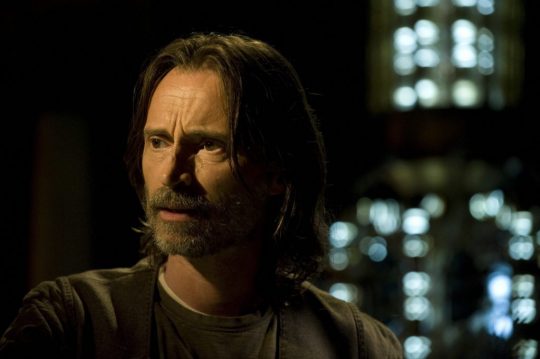
It's typical. A loud noise sends a character back into a hostage situation, a war, or a gunfight. When faced with the majority of reporting on PTSD centers around combat-related PTSD (source), it makes sense that it's the shellshocked veteran we often see in books, TV, film and comics. However, the civilian population that experiences PTSD is 13 times larger than its military counterpart. Of course, there are more civilians than those in the military, so naturally, that population is bigger. This article is not meant to dismiss those in the military who deal with very real and terrible side-effects from their time serving.
However, it does beg the question, what does a character with PTSD look like when their trauma is outside combat?
I think a very good study of this sort of character is Dr. Nicholas Rush from Stargate: Universe. There are many other characters out there that I could use, but I'm in a SGU mood today, so I hope you'll forgive me.
At the beginning of the show, Dr. Nicholas Rush is a difficult man. Unable to deal with his wife's terminal cancer, he drowns himself in work so he can avoid the pain of losing her. When she dies while he is off-world, this complicated grief drives him to focus on the mission of the ninth chevron because he has to make his absence from her deathbed mean something. After all, if he didn't succeed, he would not have an excuse. Without the excuse, he would confront the nasty truth that he didn't support his wife in her dying days because he couldn't handle the grief.
The ninth chevron leads him to the Destiny, a ship far beyond the reaches humanity could ever dream to go, with a singular but ultimately mysterious mission. His doggedness to stay on the ship, and follow the mission is likely a reaction to his own inability to come to terms with the trauma of losing his wife.
Because of this, he approaches situations from an ultra-logical world that doesn't exactly coincide with the emotional gray side of the human experience. That's why when he felt that Colonel Young was repeatedly putting lives and the mysterious mission of Destiny in danger, he decided to... frame him for murder... and when that didn't work, stage a coup.
I promise, within the confines of the show, those were actually both very rational decisions.
The coup was the last straw for Colonel Young, so he abandons Rush to die on a desert planet that has no stargate and therefore no possibility for escape. So, metaphorically, Young essentially commits the murder that Rush tried to frame him for.
It is there, on a sandy planet without food or water, that the narrative of Nicholas Rush's PTSD starts.
While attempting to escape, Rush alerts an alien race called the Nakai to his presence as tries to fix a crashed alien spaceship. For the Nakai, it's a lucky find because they are hell-bent on boarding Destiny. Why do they want to get on Destiny? I don't know. They're aliens. Sometimes you don't get to know the why when it comes to aliens.
On their ship, Rush is tortured and imprisoned in a water tank (this is important later). So for the PTSD counter, we have both abandonment and abuse to contend with. His feelings about Young essentially murdering him for doing what he thought was right for the ship are compounded with being mentally torn apart by the Nakai.
Flash forward, Rush is accidentally rescued from the Nakai's clutches due to a lot of plot points I'm not going to go into. Frankly, it's very likely most of you haven't seen the series��or have forgotten more about it than you remember—and the last thing I want to do is turn this article into a Stargate: Universe season recap.
So, back on the ship, Rush isn't sleeping, which you find out after he commiserates with fellow torture victim Chloe. It's assumed that it is for the same reasons as Chloe, which are vivid nightmares. For those of you keeping track, that is a classic sign of PTSD. The subsequent not sleeping because you're afraid of having more nightmares is also a very strong indicator.
Unfortunately, insomnia leads to emotional decision-making, usually based on your experiences in that trauma. But let's put a pin in that for just a moment, and we'll fast forward to a later episode entitled "Pain."
In "Pain", the crew accidentally bring a tick onboard that causes vivid hallucinations, some of which are paranoid delusions. For everyone who experiences this, there is little rhyme or reason why the hallucination starts, and they go with it unquestioningly.
Rush, however, is different. His hallucinations are all triggered. When under the influence of the tick, Sergeant Greer (a proponent for Young's leadership) threatens Rush. Because of this, Rush experiences flashbacks to the Nakai ship and sees everyone as a potential Nakai threat. Paranoid ideation is a symptom of PTSD. When I say "paranoid" though, I fear that this may be read dismissively. PTSD, in many ways, is a survival mechanism. It's a set of prefab reactions because you have already experienced something similar. Essentially, it's not paranoid ideation to you, because it's happened before.
It is unclear if Rush himself was affected by the alien organism, but it seems very likely that his reaction was hinged on the perceived/very real threat to his survival. The fact that it has been established that he has not been sleeping for episodes now, and his hallucinations are of past experiences—such as the room flooding with water, or seeing other members of the crew as Nakai —it seems more than likely that Rush's experiences in this episode are PTSD-related and not due to the tick.
This, however, is not our only brush with PTSD. Let's move forward to the next season, where he finds the bridge of Destiny and hides that discovery from the rest of the crew.
One of the cool things about Stargate: Universe in the first season is that they never find the bridge of the ship. They don't even know there is one because Destiny is so massive and broken, they haven't found it yet... or perhaps the Ancients were so culturally different at the time they didn't design the ship with a bridge in mind. Even if they did, there would be a fair chance the crew would have no idea how to use it.
So, Rush—who is established to still not be sleeping after an incursion with the Lucian Alliance—finds the bridge of the Destiny. Until now, he and the Science Team had been interfacing with the ship in what I think is probably a janitor's closet, so this is an incredibly important find because it is vital for the survival of the ship and the crew. Naturally, that means Rush should want to share it, knowing what we know of him from before he was abandoned on the planet and then tortured by the Nakai. Before, it was the greater good. Now, it's survival is first and foremost.
But no. Rush, instead, reasons that Young cannot be trusted with this find, and starts to lead a double life of surreptitiously guiding the ship (to disastrous results) and pretending like he's still doing things from the Control Interface Room/Janitor's closet.
But what led him to do this? After all, keeping this find under wraps leads to dire situations that compromise the survival of the crew, and indeed causes the death of one member. It is not a rational decision.
Except that it is. If there is one thing I want to make very plainly clear in this article, PTSD-sufferers reactions are rational, even if they don't seem that way to an outsider. I think oftentimes we nitpick plots in fiction because characters make decisions that seem illogical to us. Sometimes this is deserved because an author did not sufficiently help us empathize with a character, other times I think it is because we don't understand what it means to have PTSD.
You don't have to be triggered to have PTSD affect your decision-making process. You see, unmanaged, PTSD gets you stuck in survival mode. It's an undertow that drags you down with things that were true but aren't necessarily true now.
So in Rush's sleep-deprived, and exhausted state-of-my-mind, he reverts back to Young being the threat despite all the work they had done to repair the relationship. While some may be frustrated with this backstep, I can't tell you how much I appreciate that about his character. It explains the rationale for doing something irrational, and makes his character so much deeper.
The beauty of Stargate Universe is that it shows PTSD as it is. Even better, no one is excusing Rush's actions because of it, and/or invalidating his experience. It simply is.
PTSD is so misunderstood, it deserves logical, rational representation, and it gets that with logical, rational Dr. Rush. I mean, let's face it, there is logic to what goes on in a PTSD-sufferers brain, but it's logic from a different time period. Dismissing it as irrational is insulting, and I love that Stargate: Universe never does that, and I think it is exactly why Rush is such a deep and meaningful character.
In the end, I think there is a lesson writers can draw from this: don't be afraid to explore this within some of your characters. Understand their viewpoint, and what drives them to make their choices. If you do that, you will never have a boring story.
12 notes
·
View notes
Text
BnHA Chapter 250: Why Is This Family Not in Therapy
Previously on BnHA: Fuyumi invited everyone over to Camp Todovid for a wholesome family meal because what could possibly go wrong. Kacchan and Deku proceeded to spend the evening blinking distress signals at each other in Morse code while Natsu shoved breadsticks into his purse and skedaddled after getting mad at Endeavor in a completely unexpected turn of events which absolutely no one could have foreseen. After dinner, Shouto had a heart to heart with Fuyu (and then Deku) about whether or not he was ready to forgive his dad, and meanwhile Endeavor said a prayer for his very dead son Touya. Poor Touya. He was such a nice boy. You know what he really used to like? Messenger bags. He’d put the oddest things in them, too. I wonder if Touya would still enjoy collecting strange and disturbing things in bags if he was still alive today. Alas. We’ll never know.
Today on BnHA: Some guy named Takami who just got out of prison decides to show up out of the blue and fucking kidnap Natsuo because WHY NOT. But before that happens, we get a nice scene of Kacchan and Deku sitting down with Shouto and Fuyu, who finally decide it’s high time they talked about THEIR SECRET DEAD BROTHER seeing as LET’S BE REAL, THAT WAS THE WHOLE POINT OF THIS DINNER TO BEGIN WITH. So basically, (1) he’s definitely dead! For sure! 100% deceased!, and (2) Natsuo apparently blames Endeavor for his death, lol no big. Deku and Kacchan are for some reason super fucking chill about hearing this, and then Endeavor comes over and is all “TIME TO HEAD BACK” and omg I’ve never hated him more. And then as they’re driving away from Todofield Hall, Takami shows up and is all “HEY ENDEAVOR LOOK I KIDNAPPED YOUR CHILD AND I’M GONNA KILL HIM!” and holy shit but Horikoshi is just fucking with us now, though.
(As always, all comments are my unspoiled reactions from my initial readthrough of the chapter. I did a quick edit for grammar and clarity afterward, and added some ETAs in the process, but aside from that there are no changes.)
all right manga, do your worst. I’m completely spoiler-free on this one. watch it not even be a flashback, after all of that lmao
(ETA: lol I read these two asks after I read the chapter and they’re pretty great:


honestly this week wasn’t that bad, though! the worst part of it was the whole “only 13 pages again” thing honestly. next week, though, it looks like we’ll be in for some fun times. oh goodness.)
so it appears night has fallen on Todofield Hall, and hoooooooooly shit you guys, are they. are they all gonna have a sleepover at Shouto’s house, because fdszllk I. I’m gonna. ldskfjla
(ETA: [kicks Endeavor in the shins] why do you hate fun!?)
who is talking?? are these prison stripes??
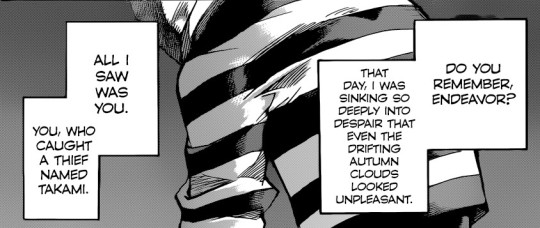
so is this the Takami guy narrating, then? just like we all predicted last week. ???
(ETA: so I saw all these people going “wtf is this Hawks’s dad??” and I was like “lol what” and it took me longer than I’d like to admit to put two and two together, but anyways, long story short, “Takami” just so happens to be Hawks’s recently revealed surname (with the same kanji and everything -- 鹰見). so while every instinct in my body is screaming at me “gtfo no way they’re related”, it is an extremely bizarre coincidence, so uh. ?? I got nothin’, basically.)
WHAT THE FUCK
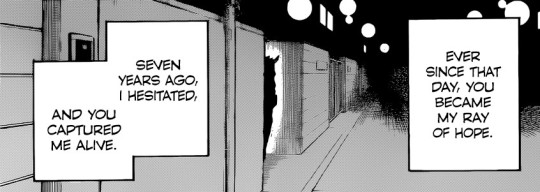
IS THIS GUY STALKING THE TODOROKI HOUSE. ABOUT TO BREAK INTO TODOFELL IN THE DEAD OF NIGHT WHILE MY CHILDREN ARE ASLEEP!? CAN THEY JUST NOT CATCH A BREAK
also I will never understand villains who get all smug about being captured alive. “your one mistake was not killing me when you should have!” like okay, so you’re admitting you’re a piece of shit who should have died, and that the hero totally could have done it, but they were nice enough not to so SHAME ON THEM, apparently
anyways I really don’t understand what’s going on at all lol. some guy looked up to Endeavor and then got himself captured by him for some reason. let’s continue I guess
oh lord it keeps getting creepier
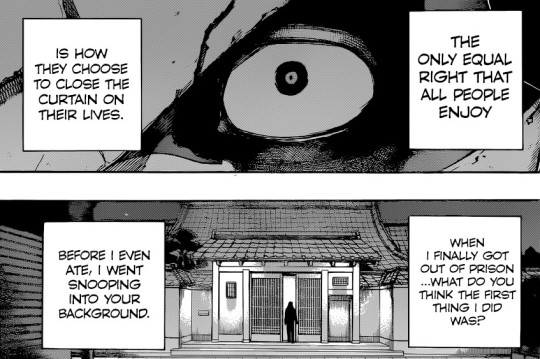
-- oohhhhhhhh shiiiiiiit, is this fucker about to air Endeavor’s dirty laundry?? is that what this is about?
AHHHHH
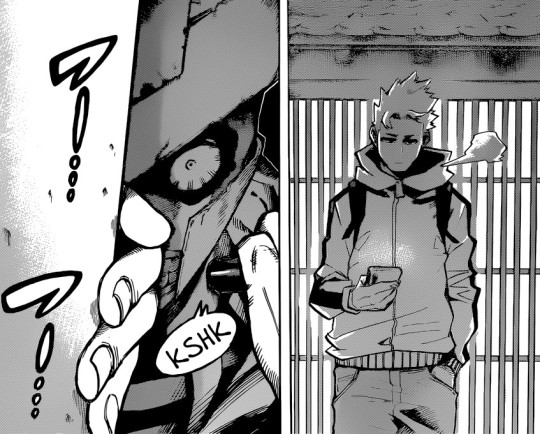
NATSU SWEETIE WHERE ARE YOUR SELF-PRESERVATION INSTINCTS?? IT IS NOT SAFE! and also what the fuck, does Endeavor just not have any security in his home at all? surely he must, if for no other reason than the fact that HE HAS KIDS and he’s not always at home! I have to imagine that any pro hero with a family understands that they’re a potential target for villains and would take precautions. I wonder if we’re about to see this sneaky guy get wrecked
(ETA: nope, Endeavor really has no security whatsoever and Natsu got snatched while waiting outside for his Uber. I’ll give him the benefit of the doubt and assume that he was too busy missing his brother and being sad to remember that he actually has a quirk himself. c’mon Natsu.
-- actually, come to think, props to Horikoshi for once again bucking the trend and having a guy be the one who gets kidnapped and becomes the damsel in distress. I’m just going to assume that had Fuyu been the one to get captured, Endeavor wouldn’t have even heard about it until he received a text from her with a picture of the guy encased in ice and a caption asking “so dad, uh, what should I do with this?”)
BUT FIRST, WE’RE CUTTING BACK TO THE TODOROKI KITCHEN, WHERE TODOBAKUDEKU ARE CURRENTLY HAVING TEA WITH FUYU BECAUSE SOMEBODY UP THERE LIKES ME YESSSSS
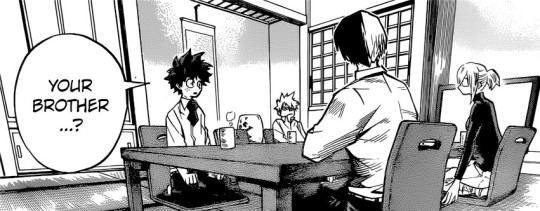
hhhglkohhhhh myyyyy godddddd
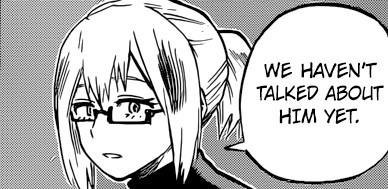
I KNOW!!! WHAT’S WITH THAT! WE’VE WAITED 250 FUCKING CHAPTERS PUTTING UP WITH YOUR SLY-ASS HINTS ALL ��ALL RIGHT THEN, KEEP YOUR SECRETS” but is it finally time now? IS IT??!
Shouto says it’s not exactly an easy topic to bring up, and okay, fair. buuuut also, this is the same child who ambushed Deku in a corridor back when they barely knew each other and was all “let me tell you all about my dad’s quirk marriage and how he abused me and my mom and how I got this scar” so like. what exactly do you consider “easy to bring up” though
OH MY GOD IT’S HAPPENINGGGGGGG
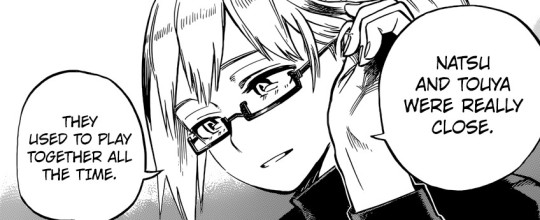
we’re getting DETAILS. ABOUT. TOUYA’S PAST fkdslfh holy motherfucking shitballs someone pinch me
she says it happened right after Rei got hospitalized, which yeah, we all figured based on the middle school uniform in the photo. so that definitely pins down his age then, doesn’t it? Shouto was six when that happened, so if Touya was in middle school he’d have been between 12 and 15. so it’s very likely then that he was 14, the exact same age as Fuyu, so therefore THE TWIN THEORY IS CONFIRMED! WE DID IT TUMBLR
anyways back to being sad though, because
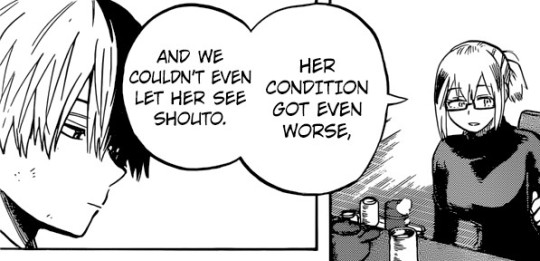
can someone please hug this child?? what are you all even doing?! do you not see his face?? jesus christ
oh no oh my god are you serious are you
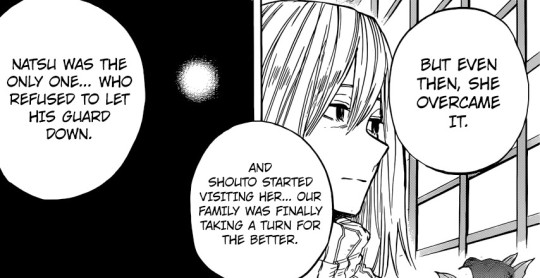
okay, before I go on to the next panel and commence FREAKING THE FUCK OUT, I need to stop here though, because the thought that the Todos actually were in the process of healing nine years ago and could have potentially been spared years of additional pain had it not been for this tragedy is. just. I fucking can’t. I need a minute here. god
anyway. so now on to the freaking out though, because
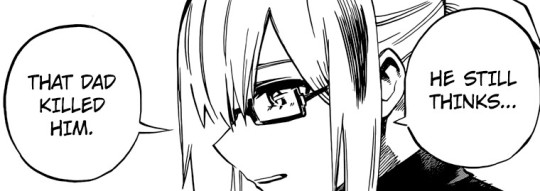
:) :))) :))))))) huh. you don’t say
(ETA: hmm in hindsight I promised freakouts and then all I did was go “:)” but please understand that the “:)” conveys so much more inner freaking out than words could possibly communicate. just picture me screaming and waving my arms around like a Kermit the frog gif okay.)
look at this you guys. this revelation is so stone cold fucking sober that it even got Katsuki to make an actual normal face for the first time in god knows how many chapters, wow
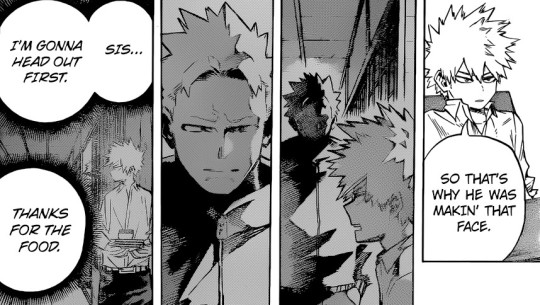
by the way, words can hardly express how much I appreciate that Katsuki is sitting here chilling out drinking tea with the rest of them and listening to this tale of woe and empathizing like a normal, well-adjusted person, though. I will never take that for granted. thank you character development gods. y’all are bros
anyways the face in question that Natsu was making is so fucking sad, and just. THEY ALL NEED HUGS. why is this family not in therapy
NO!!!!!!!!!!!
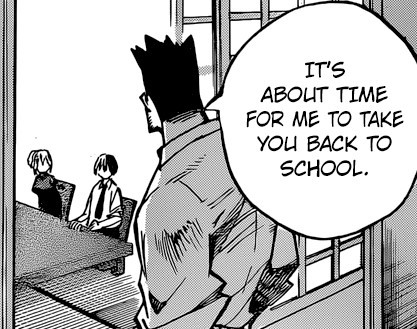
YOU SON OF A BITCH!! JUST LIKE THAT YOU’RE RIGHT BACK ON MY SHIT LIST, ENDEAVOR!! CHRIST ALMIGHTY ARE YOU SERIOUS, SO WE’RE REALLY JUST GONNA LEAVE OFF THERE? “LOL SO YEAH, NATSU STILL THINKS DAD KILLED OUR BROTHER AND THAT’S WHY ALL THE TENSION” and Deku and Kacchan just nod like that is in any way a satisfying explanation rather than an INCREDIBLY OMINOUS STATEMENT which only goes and raises about A BILLION MORE QUESTIONS OMG. “oh okay, so he hates your dad because he thinks that he murdered your mysterious other brother we’re only just now hearing about. say no more. no further context necessary” fucking --
listen, you two. where the fuck are your investigative skills?? SOME SCOOBY SQUAD YOU ARE!!
oh my goodness gracious
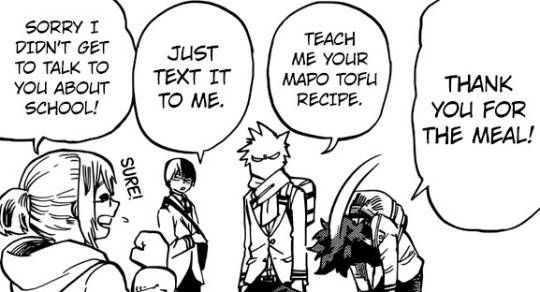
listen guys, things I was not expecting to check off my character development bucket list today: Katsuki joining the Fuyumi fanclub and bonding with her over recipes. I wasn’t even aware that was on my list. BUT IT SURE WAS, AND IT’S CHECKED NOW AND I LOVE IT
also love that Shouto tells Fuyu to just text the recipe to him, and then he will share it with Katsuki. because they are best friends
also Deku is the only one here with any manners at all but oh well. we all been knew
(ETA: though to be fair, Katsuki asking for the recipe is about as big a compliment as one can give to a chef, and it kind of serves as a combination “thanks for the meal” and “everything was really good” tbh. shit, now I want her recipe.)
fdlkjfg
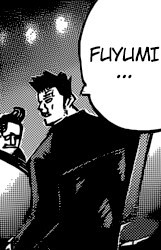
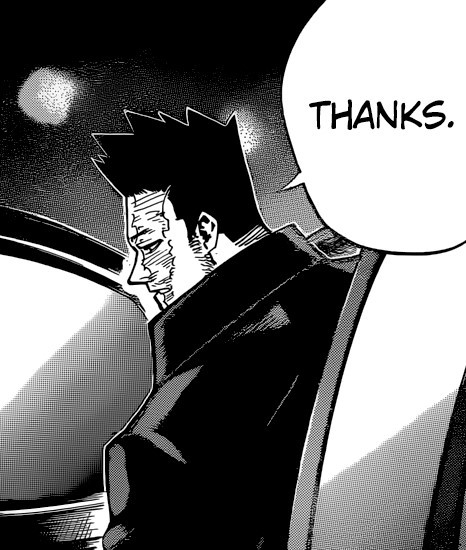
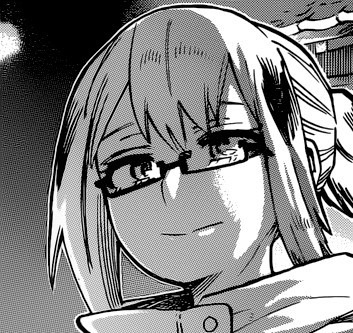
... [reaches out to gently touch the panels] so soft
-- BUT DO YOU KNOW WHAT’S EVEN SOFTER?
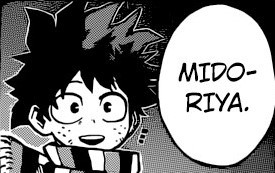
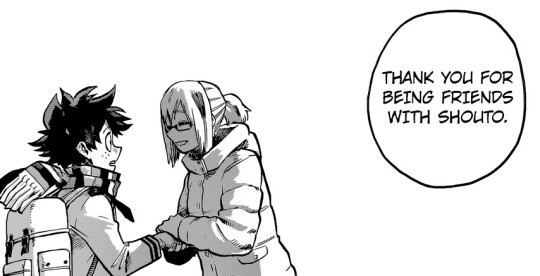
[faint sound of my heart imploding] ah
oh my god his face

and Katsuki’s face too. boy are you jealous. to think you were all “WHY THOUGH!?” coming here, only to walk away from it all with a kickass new mapo tofu recipe as well as a new person to add to your secret list of people you would literally die for. awwwwwww
and Shouto. omg. this is the most bashful panel I’ve ever seen. what a blessed chapter
anyway so now they’re all driving away (back to school?? I think he said?) and Endeavor’s talking to them about their upcoming schedule. so I guess they are heading back to school, then
anyway so he wants them to work the weekend as well as two weekdays? damn that’s a lot of class to be missing, he’s asking them to skip literally half the school week (since they have Saturday class too)
wow you guys look at this panel
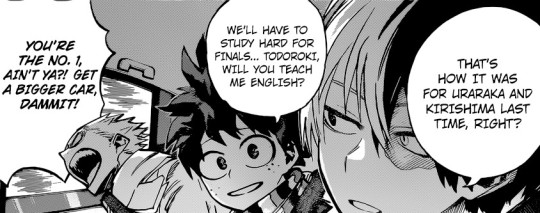
takeaways from this: 1.) I honestly would have thought Deku would be the one tutoring other people in English, if anything. as of the midterms, he was above Shouto in academic rankings, but more importantly he’s also the biggest All Might fan on the planet, and All Might spent a lot of time in America in his youth and presumably speaks decent English himself, so you’d think Deku’s English would be passable just from his obsession alone. but I guess you just can’t beat that fancy private school education
and the other takeaway: Katsuki doesn’t like being squished in the backseat of a cramped Japanese car with Deku and Shouto. this one is absolutely shocking. I’m gonna need a moment to process this for sure. anyways poor Deku, he’s probably getting so many elbows to the ribs right now. I hope he elbows back
(ETA: actually the fact that Katsuki is apparently sticking his head out the window here in addition to complaining about the cramped conditions makes me wonder if he’s actually getting carsick. my poor baby do you need some dramamine.)
guys, meet Endeavor’s chauffeur

so anyway this is a bit sudden but I have a new favorite character now. life is funny like that. does he remind anyone else of Major Armstrong
wow Endeavor is answering the question seriously
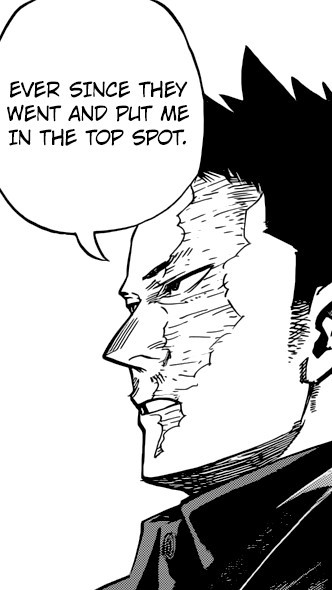
okay but shit, I really fucking love this answer, though. he’s so matter-of-fact about it. because the thing is, the question isn’t really “when did you start baby-sitting a bunch of kids”; it’s “when did you actually start caring about something other than yourself?” and the answer is that it happened when he finally reached the top and realized the responsibility that went hand in hand with that role. it forced him to finally look past just himself, and to think about what it really means to be a hero. shit, I feel another essay coming on, but it’ll have to wait for some other time lol. we still have to see if Natsu’s going to make it out of this alive
anyway so now Armstrong is chuckling and saying that status really does change people huh, and they’re driving on into the night
OH SHIT

THAT’S A NICE SON YOU’VE GOT THERE, ENDEAVOR. IT WOULD BE A SHAME IF SOMEONE... okay you know what, I’m not sure where I was headed with that joke, but in any case I can’t finish it because this isn’t funny at all actually, this is actually SO FUCKING BAD oh shit oh shit
NATSUUUUU
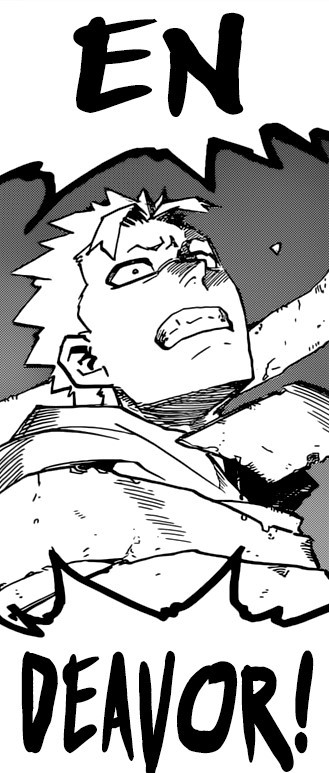
oh no he’s so scared oh fuck. fuck. he’s only 19, he’s just a kid still. god. why do I always get so worked up over these parts. what am I doing reading a shounen manga if I can’t handle seeing kids in peril. HORIKOSHI PLEASE BE KIND TO MY BABIES
holy shit
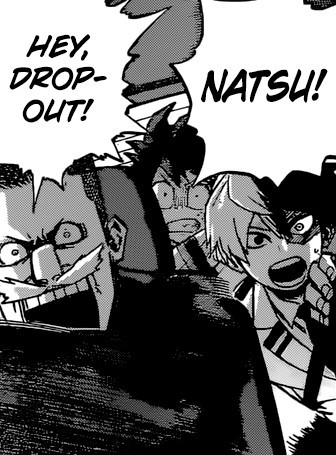
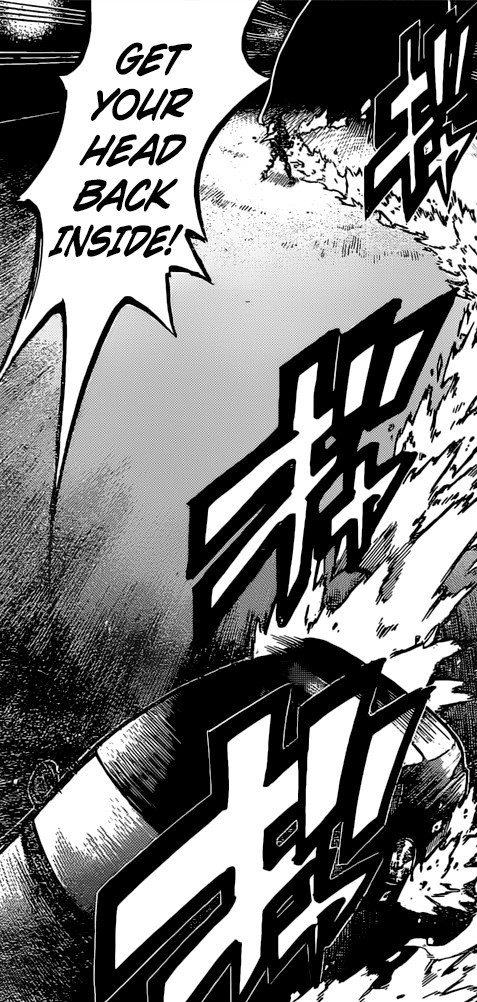
okay, is this implying that Katsuki was sticking his head out of the window in that previous panel?? I realize more important things are happening and this is hardly the time to dwell on this, but jesus christ my kid is out here trying to get himself decapitated. boy what is wrong with you
anyway so now something is going "pop” and I have no idea. ??
(ETA: lol I guess it was Endeavor? you know, how Endeavor sometimes just goes “pop” for no reason. that’s just the sound someone makes when spontaneously bursting into flames.)
oh
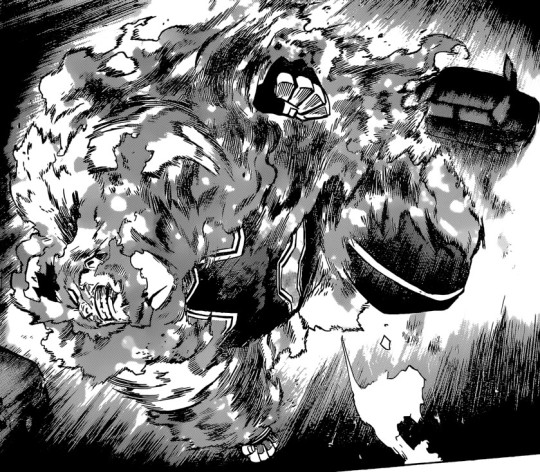
far be it from me to start whipping out analogies about a mama bear and her cubs, but. damned if that ain’t what’s happening though. motherfucker, you mess with his kids? so would you like to die fast, or slow
so now some weird fucking shit is happening to the car, and I guess it’s this guy’s quirk again?

wow my man, so you’re really attacking the car with the three protagonists with SOMETHING TO PROVE in the backseat. you really do have a death wish
(ETA: on top of that, attacking the car mere minutes before the winter break ends, and with it, the deadline for “defeating a villain quicker than Endeavor.” HMMM anybody got some popcorn?)
now Endeavor is shouting “LET HIM GO!” because that’s what superheros shout when someone is being kidnapped
lol poor Natsu looks kind of awkward now
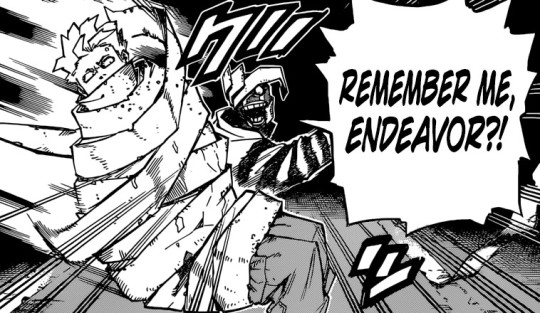
like, don’t get him wrong, he’s still scared for his life. but also he’s starting to get a bit of that same feeling that Katsuki and Deku were getting in the last chapter, like he’s suddenly found himself right in the midst of some grade A melodrama from which there is no escape. anyways don’t mind him, he’s just going to chill here in this big pile of bandages and see where this goes
so Endeavor is all “........... YOU’RE FROM SEVEN YEARS AGO!” and honestly that’s impressive. I guess the quirk is a pretty memorable one, though
wow now they’re suddenly being all coy with this guy’s name? what the hell
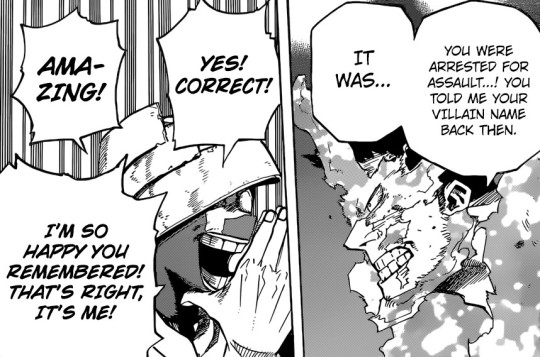
?? Natsu bud, I feel ya, this really is some awkward shit right here
ohhhh!
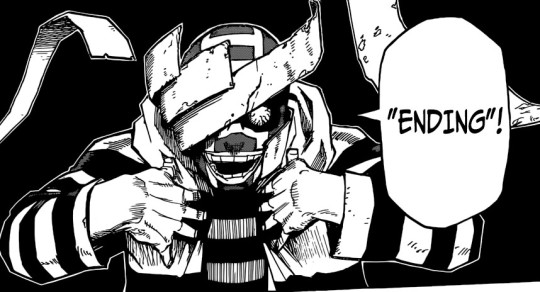
that’s the name of the chapter! well all right then, so at least that much makes sense now
so now Ending is apologizing to Endeavor, and wow, tons of essay fuel in these next two panels here
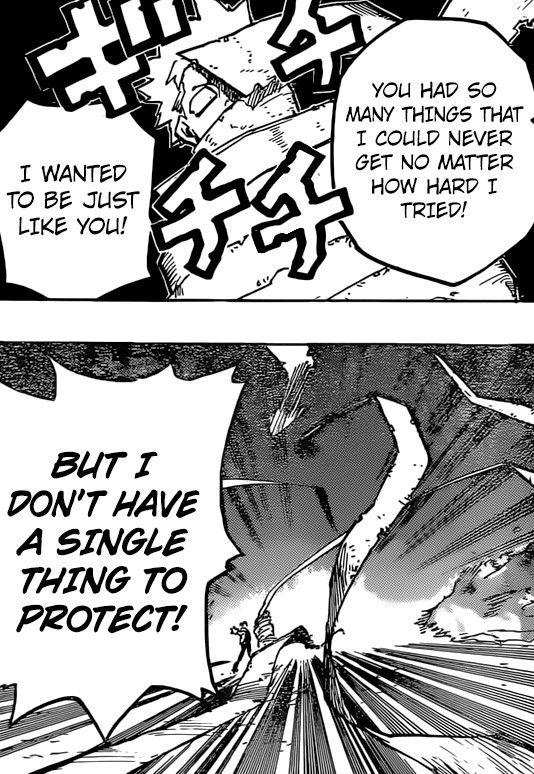
“you had so many things that I could never get” doesn’t this sound remarkably similar to Deku’s speech to Kacchan during their second fight at Ground Beta? huh
and also, I think we are slowly dancing closer and closer to the Thing Katsuki Lacks That He Needs To Learn From His Internship From Endeavor. what do you guys think? I have a lot of thoughts about this, but again, I’ll save it for another post seeing as shit is hitting the fan right now and all
OH SHIT

ARE YOU SERIOUS, OF ALL THE TIMES TO HAVE ANOTHER THIRTEEN PAGE CHAPTER! HORIKOSHI YOU ARE FUCKING KILLING ME HERE
well shit. okay so when he says “don’t make the same mistake twice”, he’s clearly talking about Endeavor letting him live the last time they met, but also I can’t help but feel like there might be some kind of double meaning here as well. the fact that he went from theft to kidnapping and attempted murder, on top of him mentioning earlier about how he went digging into Endeavor’s past, makes me wonder if he could possibly be trying to recreate a specific set of events. or is that crazy??
but just, hear me out. what if something similar to this went down before, with Touya perhaps being taken hostage by a villain (though it couldn’t have been the same guy because the timing is off, and also Endeavor didn’t recognize him right off the bat), and Endeavor making some critical mistake which resulted in him failing to save him, and Natsu then blaming him for that and holding him responsible for the death. honestly that makes the most sense to me, since I would think that “literally murdered his own kid” would be kind of a deal-breaker as far as the rest of the family ever reconciling with him. so yeah, this could get very interesting here
(ETA: hoo boy, so I’ve been browsing the bnha tags a bit, and it seems that a lot of people are interpreting the hints in this chapter very differently from me lol. I admit I could certainly be wrong about the “don’t make the same mistakes” bit having a double meaning. but like, do we really believe that Endeavor just straight up murdered his son and got away with it, or that it was covered up or something? or that he drove Touya to suicide? I think it’s much more likely that Touya pushed himself too hard, or that he accidentally got caught up in one of Endeavor’s attacks, or something along those lines.
what really struck me, though, was that a lot of people actually seem to be hoping for it to come out that Endeavor really is responsible, though. like, to the point where they’re prepared to be outraged if it turns out he’s not, and this part of the story doesn’t end up conforming to the narrative of Endeavor just being a sinister cartoon villain. and like, I don’t really know what to say about that. except that I really hate this idea that if an abuser is ever portrayed as something other than a heartless monster then it’s super-problematic and/or just bad writing. that Endeavor not murdering his son = Horikoshi endorses child abuse. or something. anyways I don’t have the spoons to really throw my hat into the ring here, but basically my opinion is that life is rarely just black and white in that way, and this story reflects that, and I think it’s absolutely the right call to make and is actually very good writing and I respect it.
and also like, it’s not some all-or-nothing thing here where he’s either a perfect saint, or the worst person to ever exist! what he is is a man who made some terrible choices in the past and abused and hurt the very people he should have loved and protected the most. and what he is, also, is a man who has realized the awfulness of the things he’s done, and is trying his best now to be a good person. what he is is a human being. and acknowledging that doesn’t mean that you condone the abuse; it simply means that you acknowledge that people are made up of more than just the worst things they’ve done in their lives. that’s it.
anyways, for all of my “not gonna through my hat into the ring” nonsense, I’m doing a pretty good impression of exactly that, so I’ll shut up now. damn you Endeavor and your controversy-sparking ways. what kind of psychopath looks at the fucking BnHA fandom and says “not bad, but you know what this place could use? more discourse.” you knew exactly what you were doing, you fiend.)
anyways I’m going to hope and assume that Natsu isn’t actually about to meet his end here at the hands of this bestriped man and his peculiarly thematic villain name and sinister bandage arrows (are they bandages?? maybe not since they seem pretty solid and he’s threatening to stab Natsu in the eye with one. idk). and for all of my joking earlier, this guy actually does appear to have a real, genuine death wish since he keeps talking about how Endeavor should have killed him before. so in addition to all this other drama, toss in an attempted suicide by cop as well! this fucking arc, man. goddamn
#bnha#boku no hero academia#bnha 250#endeavor#todoroki touya#todoroki natsuo#todoroki fuyumi#todoroki shouto#bakugou katsuki#midoriya izuku#bnha spoilers#mha spoilers#makeste reads bnha#'let's all have dinner together at icyhot's house' they said#'it'll be fun' they said#didn't even get to finish his gd mapo tofu#got shouto's creepy brother staring at him in the dark#and then this whole thing with his other brother who's apparently f***ing dead because of course he is#and icyhot's stupid sister thanked deku for being his friend but not him!#and then he was crammed back into this tinyass car again with these morons#and now the goddamn brother has been taken hostage because of course he has!#what did katsuki ever do to deserve this#sorry kid
137 notes
·
View notes
Text
So I finally finished playing Burial at Sea parts 1 and 2, wrapping up my replay of Infinite. The last time I played these games, I had a really visceral dislike of the ending to Infinite, and didn’t even finish part 2 of BaS for the same reasons. Having played them again, I am really satisfied with how the games came together, and how strongly it reinforced its themes in BaS.
Bioshock has always been about choice, consequence, and the relationship between people. More specifically it tackles choice in relation to your past, and whether you can (or should) try to make up for your mistakes.
To me, Infinite was a very interesting experiment in telling a story, because I think without serious analysis, the player is led to the wrong conclusion. The way I read it, Infinite is making a case specifically for breaking the cycle of violence by....showing how difficult it is to break the cycle of violence.
Booker and Comstock represent two polar opposite reactions to making mistakes. Comstock discards his past completely, and with it, he discards valuable lessons in empathy and compassion. He becomes a man obsessed with righteousness, purity, and ruthlessness. Booker stews in his past and never moves past it. He refuses to forgive himself for the mistakes that he made, and that self-flagellation keeps him in a cycle of shame and wrong-doing. However, this isn’t just a case study of Booker/Comstock. Infinite raises the stakes by using Elizabeth to illustrate to us that _anyone _can fall victim to the cycle of bloodshed. The game is all about trauma, forgiveness, and violence - from Booker empathizing with how Slate is sent to war and then discarded like an old toy, to Fitzroy trying to find belonging with Comstock’s family, only to be framed for murder and radicalized into a rebellion leader, to Elizabeth finding compassion for the mother that abused her who was herself abused by Comstock, to Songbird - Elizabeth’s captor and only friend, itself a captive with a friend only in Elizabeth. The point is that every single one of these people are trapped in a cycle of violence that traumatizes them, which in turn forces them to traumatize others, perpetuating the cycle.
The end of the game brings that big structural-level cycle back into the personal relationship between Elizabeth and Booker when it reveals that Booker and Comstock are the same person. Booker is responsible for Elizabeth's life, and she now has to decide what's more important to her - the tentative relationship she's built with Booker thus far or getting revenge for what was done to her as a child. This is the turning point for Elizabeth - and therefore where the game puts the period on its thesis. When Elizabeth chooses to kill Booker, she feeds into that cycle of violence and.... essentially becomes Comstock. She has chosen violence for the ‘greater good’. She has declared that there are some things you can never come back from, some things that you deserve to die for. And she does so discarding many of the lessons about compassion, personal connection, and forgiveness that she learned along the way. (It’s also very important to note that she makes her decision because she ‘knows how the story ends’. Upon replay, I think the game has some very interesting things to say about whether this statement is true. Comstock also knew how the story ended, which drove his own villainy. In essence, the game is saying that this type of ruthless realism is just pessimism in disguise, and that it WILL turn a person into a monster. It's only when Elizabeth loses her powers in BaS, when she becomes a regular person with no concept of the future again, that's she able to see the power of optimism and find some redemption. )
I believe the complexity of that message (and the admittedly confusing packaging it came in) was lost on a lot of players, which is why in my opinion Burial at Sea doubles down so intensely on the themes. Part 1 is literally about Elizabeth becoming the villain. They make that very clear by redeeming Booker/Comstock through his kindness towards Sally, and villainizing Elizabeth via use of Sally as a tool to get to Comstock. Then, at the beginning of part 2, Elizabeth is exactly where Booker was at the beginning of Infinite - with the blood of a child on her hands, wondering what chance she has at redeeming herself. That search for redemption morphs into an understanding of the importance of human connection. Ultimately, despite it being a lost cause, it matters that Elizabeth tries, over and over again, to save Sally. It matters that Elizabeth misses Booker, that Elizabeth helps the Big Daddy, that Elizabeth saved Songbird when she was a child. Those small human connections are the true heart of Bioshock, and the thing that Elizabeth lost at the end of Infinite when she sacrificed Booker. So many little things point to this central message - the ‘lion with a thorn in its paw’ metaphor, the stories of the big daddies and songbird, the ‘imprinting is not found in genetic code’ line, the guitar/singing scene in Infinite, and - my personal favorite part of Infinite - the scene of Booker trying to get Anna back as a baby before she’s taken through the tear.
There’s definitely something to be said there about the foolishness of playing God. All of Bioshock’s villains have sought to shape the world to its best (in their varying opinions) form. Elizabeth does the same. Upon seeing that a bad choice can be made, she chooses to take the choice away, failing to realize that there’s no way you can do that for every bad thing that will ever happen in life. Though the game doesn’t show you the consequences of Elizabeth’s choice (note however that Burial at Sea very much does), it implies by everything that comes before that killing Booker will only perpetuate the cycle of bloodshed. The 'best' choice, thematically, should have been for Elizabeth to forgive Booker for being human and making mistakes. But the game wants us as players to understand how difficult a choice that is to make - so difficult that Elizabeth herself couldn’t even make it.
Ultimately, Elizabeth is redeemed in death, because she chose to fight for the lost cause of saving Sally, even though she knew how it would end. Even if Elizabeth had once sacrificed Sally trying to get to Booker/Comstock, it still mattered that Elizabeth tried to save her - just as it mattered that Booker tried to stop Comstock from taking Anna pre-Infinite. We, as human beings, are more than our pasts, because every moment we can make the choice to change. When we use our pasts to help us navigate the future, when we allow the past to give us empathy for other people and for ourselves, rather than wallowing in it or forgetting it completely - that’s how we can make choices that matter.
#sorry this is so long#i could have written even more tbh#i just really like how they approached all this#the multiverse aspect of this also makes it a very positive ending because#it means that somewhere there IS an elizabeth who forgave a booker#a booker that never gave up anna#a comstock that didnt build a city of blood#most importantly#an elizabeth that made it to paris#it would have been nice for that to be more apparent in canon#but BI certainly did not want to hold the players hand through these themes#bioshock infinite#bioshock infinite spoilers#bioshock#bioshock spoilers#burial at sea#burial at sea spoilers
5 notes
·
View notes
Text
An homage to Kasuka...
...and why he’s so relatable.
She(Ruri) was barely able to wrench out the words, “That’s a line...from ‘Carmilla Saizou’...”
“Yes, he’s one of the figures I respect most.”
“Respect? A character that you play…?” she asked in exasperation, thinking of the movie that they had once worked on together.
But that accusation didn’t faze Yuuhei in the least. “That’s right. I’ve played an insane killer, an idiotic criminal, a gay man in love—and I respect each and every character I’ve acted.”
“...”
“My brother was overemotional, so I used him as a negative role model, and now I think I’m missing a number of important things for a person to have. And I understand that—which is why I think I became an actor.”
—Drrr!! Vol. 4: pg 171 - 172
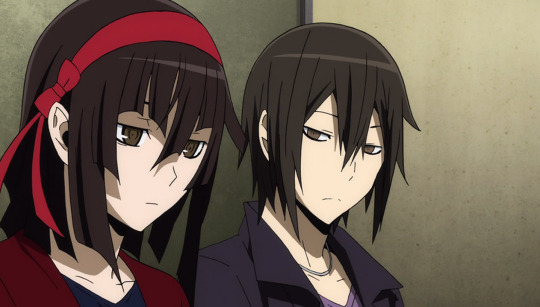
Let me explain why I really love this excerpt
It’s a succinct explanation for why Kasuka operates as he does and ultimately decided to become an actor. Within a simple exchange, we’re given a three-sixty view of his character while it defines Shizuo’s positive effect on Kasuka through the lens of a bad example.
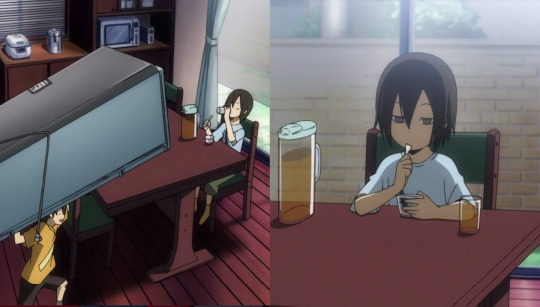
His vacant appearance isn’t just a bullet point on a character profile, it’s not some flat decision that he became the polar opposite of his brother in order to build Shizuo’s character. No — he has the utmost respect for which characters he plays on the screen. RESPECT. Not just a casual appreciation, but one of high regard. That speaks volumes. It’s fascinating, why he has such confidence of who he is and how he operates. Regardless of how simply he states it, there’s in-depth logic to his reasoning.
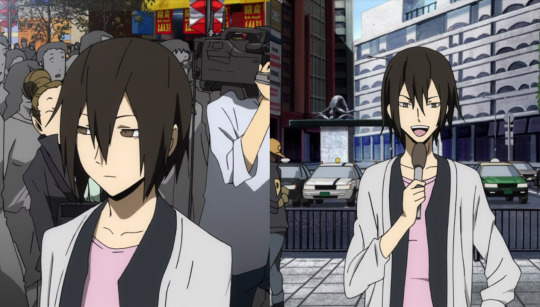
Fiction is comprised of constant variables that allow it to be studied and boiled down to a reliable analysis of human attributes — what’s normally unpredictable. Outside of fiction, the world isn't so cut and dry, its people don't follow a static code. There's irrationality to real-life emotions and how one person interacts with another comprised of the same imperfection.
Characters, on the other hand, operate within a world created with a purpose: a playground where they can thrive without a hiccup. Their emotions are written into a script and are exact. So this representation aids an actor to become another person, interact with other characters as that person; they laugh when they are told, cry where it’s designed — they mimic emotions. There’s logic to the illogical.
Thus the emotionless Kasuka wears a personality that he seems to lack — borrows their feelings, mock their emotions; by proxy, experiences what he personally stunted of own development due to Shizuo’s overabundance.
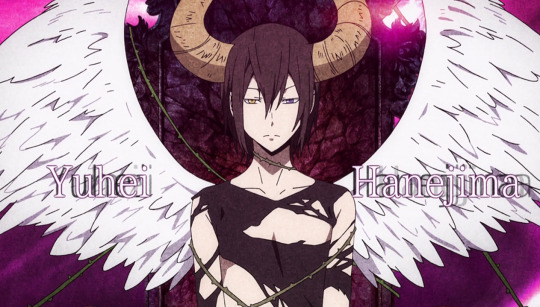
It's endearing — cute. It’s far from tragic, hardly sad, but shows us that he does have a method to express himself. He isn’t devoid of life, his flat exterior is just a blank canvas painted with an artistic image that connects him to others and touches the lives of his fans. It’s a roundabout way of getting emotional gratification without the basic sense of self.
To this I believe is adjacent to people within fandoms.
In this era, a majority of people grow up with parents that are devoted to their jobs and careers, and that neglect has an impact on children during their impressionable years. Therefore children, later adults, are unsure of how to analyze their psyche, furthermore assess their emotions without that familial example to compare themselves to. Already there’s a similarity to Kasuka.
So who can people look to for the answers in lieu of proper guidance?
Characters.
Fans are drawn to fictional worlds, fall in love with characters; inclined to build a controlled community the revolves that reality. It’s a second home, a haven, shaped with a purpose: a similar playground to the very fiction they adore, where they can thrive and have an impact, unlike the chaotic real world. And through consumption of media, people find bits of themselves within characters, even if they don't entirely share the same traits they feel those similarities. In short, people empathize these fictional beings when it’s difficult in the unpredictable real-world.
It’s RESPECT. Characters are role models, which the inclusion of them within one’s life is intrinsic to societal inclusion. To look up to a wiser individual is primal, a survival instinct to ensure that an individual isn’t neglected by the pack and met with certain death. And in the fandom specific case, characters teach people how to express themselves in a tried and true fashion which helps them fit in.
Observation of a character’s successes and failures skips them past the intimidating trial and error phase, has a direct impact without the fear of negative repercussions. Without a keen understanding of the human psyche, they learn how to better channel their thoughts into actions.
They’re a literal translation of personality, morals, ideals; because there’s an intentional limit to what people are shown, it’s easy to pinpoint those details. It’s defined. It’s logical.
They're constant variables to an equation: X character does Y and gets a Z response.
And not only can characters be used as a social field guide, but also a coping mechanism through self-improvement arcs; they’re allowed their flaws, yet redeemed and later accepted by others. A fan can reap the same satisfaction and validation as their role model or kin. If instead, the character fails to succeed, alongside the character, a fan can wallow and cry. Through substitution or projection, people can feel the depth of emotion. Which brings me back to our main man...

Kasuka reflects a lot of us out there. We respect characters that help us feel what we lack — what he lacks too. Much like we're enamored of characters, he is as well. Kasuka is valid, relatable, and comprised of broken code. Though, he is respected, adored, yet still an overall success. Most importantly, he accepts the unconventional method he uses to function in the world without shame.

There’s nothing wrong with us, my fandom peers — we’re human, and much like Kasuka is loved by Ruri, Shizuo, and others, we too deserve that love. We should embrace our flaws, learn to forgive our mistakes — love and respect our own personal character and those of others in our little community; our fandom family, if you will.
Because through the respect of characters we relate to, we respect ourselves — and if we respect others in the like, it's a proof of character. ( °∇´)⌒★
This is why I love this excerpt, why I respect characters; this is why I love to shamelessly share my love for this series with others — my fandom.
#heiwajima kasuka#heiwajima shizuo#kasuka heiwajima#shizuo heiwajima#durarara!!#durarara#durarara light novels#yuuhei hanejima#drrr!!#drrr#durarara character analysis#durarara quotes#ruri hijiribe#hijiribe ruri#my analysis#drrrx2#durarara!! x2
94 notes
·
View notes
Text
It’s me, of course I have thoughts on the MSQ , be warned there are all the spoilers below the cut

First up is--surprise!--Eulmore!
I was pretty hype hype af when I learned we were going to meet the adviser to Vauthry's father. I was sure we were going to finally get some truth out about what the dickpickle let Emet-Selch do to his wife and unborn son. Instead, we got to hear him elevated to the source of "the good old days" of Eulmore -- even though he was uncaring of casualties in the Echo flashback, even though he was bad enough at his job the citizenry was being stirred up against him, and he wanted to rule not just Eulmore, but the world, in his words.
And then we just got to stand by and /smile and /nod while everyone else laid all the blame on one of Emet-Selch’s biggest victims once again. (seriously, I will never be stop being skeeved how The Men(tm) discussed the wife’s bodily autonomy while she stood right there, looking terrified) It didn’t feel heroic, at all, just as it didn’t feel heroic how politely we dismissed the man who bought Yotsuyu and pressed her into prostitution. The narrative at least afforded Yotsuyu sympathy. I have never seen a character in this game dehumanized quite so hard as Vauthry. Meanwhile, the one who corrupted him is the fandom darling. I’d wonder why that is, but I know, and it’s depressing that is even a thing in this the year 2019.
I still do not get the reasoning behind blaming Vauthry for his actions, the one other excuse I see given for not empathizing with his plight. Claiming he is fully culpable is like blaming Thancred for the massacre at the Waking Sands. I'm not entirely sure why Vauthry should be held to a different standard than literally every other character who has been corrupted by the sin eaters.
The writers were at least very clear to establish he was physically and mentally corrupted by the Lightwarden wedged directly in his chest (on the heart side, interestingly), from the moment we met him. In the Japanese, he even shares Titania’s speech pattern, to indicate he is also “off” like they were. How could he be expected to have true control when no one else in the same situation -- not even the WoL, at the end, without intervention -- did? We're to forgive the Eulmoran nobility for being "influenced" by him, despite their having free will the entire time before we went to fight him -- but we then completely ignore he was influenced corrupted before he was even born? By a Lightwarden, that no one short of the WoL had a chance of resisting--and the WoL would have destroyed worlds, had they lost control. Would the WoL have been responsible for that, would the destruction have been their (evil) informed decision -- or the inability to resist the instincts/will of the Lightwardens?
tl;dr: It would really be nice to let it be known who the actual bad guys were. If not Emet-Selch, because explaining Ascians is complicated, then certainly Vauthry's father, rather than elevate that man to "the good old days" of Eulmore. They used a woman like an animal to turn her infant into a monster. To sweep that under the rug is the last thing I'd expect from a "hero". :s
I had to laugh that no one wanted Vauthry’s responsibilities for running the city to the point Nuzz had to be shoehorned into the role, though. And he and Dulia had some really cute squishy moments. Press f for Nuzz’s pelvis lmao
It has inspired me to do some spicy Chai arts I hope to finish soon. >>
Square is just blatantly pushing the pixel fanservice with Kai-Shirr’s deliveries, though. Getting Eulmore’s agriculture and military up and running again are dire concerns, but we are first going to focus on turning the place into a tourist trap with....an adult nightclub. Eulmore seems to be the only place in the First with airships, useful for many things, and therefore highly lucrative, but we’re....going to help with the nightclub. Alphinaud is going to faint dead away, get those Ondo pearls ready for clutching!
I loved the new dungeon and Beq Lugg, although they killed me a lot, and I am really glad the Afflicted have a chance at recovery. I am also really jazzed the canon theories for helping them out turned out to be almost identical to the theories @onewonderfulbug and I used in our RP with Unna, in her quest to separate her patron from the Lightwarden. I agonized for weeks I was not being clever enough, lmao (except her method is science-based, not “porxie”-based. Alisae ilu and I WANT TO BELIEVE but)
Speaking of Alisae, I really love they are making the Scions so much more personable, though it will cost Alphinaud his life.
An Lad seems to be Titania reborn, and I am so glad at least one of the Lightwarden-corrupted characters survived, in a way. Sad they might not remember their old life, though. :s Speaking of reincarnations, Asahi, gtfo. Datamining confirmed that is his face under the mysterious “dog’s” hood. It has to be someone just borrowing his face, but why was Yotsuyu killed off and this twerp given ANY other sort of screen time is beyond me. I am NOT a Zenos fan, lmao. I love his nose but I hate his complete lack of depth. Maybe it will get better, but not counting on it. what the fuck was even that proto-Ultima thing, jfc how horrifying. Also as a non-Dragoon and a scrub ffffffuck your animation locks Estinien. >:C I unlocked the raid but I am full of fear. Amazing music though! ALSO FORGIVEN CRUELTY MOUNT, UNNA GONNA SIT HER BUTT ON IT SOON AS SHE GETS HER HANDS ON NUTSY’S SACKS I am so sorry for making you read that with your eyes She went to NG+ immediately, to forever wallow in the time things hurt slightly less. :(
20 notes
·
View notes
Note
I was just wondering what do you think about posts that excuse Cersei's behaviour because she's mentally ill, or that if you critique its because your ableist and hate mentally ill people? Or some variation/combination of the two? Like it just bugs me in general when people automatically excuse and even justify horrible, violent and abusive behaviour just because someone's mentally ill, particularly as someone whose been on the receiving end of that behaviour from mentally ill people.
... I think I’ve made my opinion clear, but very briefly and hoping that I don’t unleash the kraken:
c.’s issues could have been solved if someone had sent her to a child psychologist before the age of then in modern au. period. because someone who grows up not having a shred of regret over having thrown a supposed friend in a well when they were twelve over a menial thing either should have had a completely different upbringing or should have gotten therapy. which doesn’t exist in westeros, but anyway, when discussing c’s issues that’s the crux of the matter;
c’s issues also hurt other people and I’m not talking about j., I’m talking about everyone around her or mostly, and the point is that the moment someone’s issues also mean hurting others... your freedom ends where others’s starts. assuming that her MH issues mean that she’s justified in behaving the way she does means that having MH issues is a free out of jail card for hurting others, which... it’s not;
spoilers: all three lannister siblings have mental health issues. same as like, 90% of the characters in these books. I’m 99% sure that the only two POV characters who doesn’t have issues that would require immediate therapy are davos (and he’s lost four kids, he has his problems) and asha, probably, and asha is just... very functional but it’s a miracle she came out like that considering her background. everyone else has issues over issues to different degrees, so... at this point disliking anyone in these books with this reasoning would mean hating mentally illy people while at the same time 85% of the characters you like most likely also have mental health issues and I’m talking just that, because I mean... if someone likes bran and not doran or viceversa I’m not going to assume that they’re ableist since both characters are disabled and both can’t walk, but most likely it’s just a personality preference, so saying that if you don’t like c. it’s because you hate mentally ill people or are ableist to me is ridiculous because like... I don’t like c. and my top five has three pov characters who have obviously mental health issues up the wazoo and one who most likely had plenty (and two out of those five also have become physically disabled as well during the series), I have gone to therapy for a damned long time myself and I hate mentally ill people now just because I don’t like a character who has MH issues? sorry but that’s like... ridiculous. you’re allowed to not like some characters because their personality is not your thing regardless of the issues they have;
also: again, c.’s issues hurt other people. those other people have no obligation to stick by if they feel like it’s detrimental to their health, same as no one has an obligation to stick by someone who is detrimental to their MH or well-being and also has no intention of changing/is aware of that. like, I can get behind wanting to support someone you love whose behavior hurts you who has realized it and is getting help/is actively trying to get better, but if that person doesn’t care or isn’t aware then no one has an obligation to stick by if it hurts them, so assuming that people who don’t like c. or whoever else or that characters in the books should stick by c. because of her issues if it hurts them is imvho not a thing people should even bring up because it implies that people have an obligation to excuse actions that are hurtful when the person who commits them has no interest in getting better, so... nah;
also there’s critique and critique and disliking a disabled character doesn’t automatically make you ableist same as disliking a woman doesn’t make you a misogynist, but like, going outside cersei: people can dislike tyrion just because they don’t gaf about him or because they don’t like the character or because they don’t find his personality that charming, but the moment the criticism turns into calling him a monster or joking about his height or basically sounding like tywin when he talks about tyrion then it’s definitely ableism and to be quite honest when it comes to tumblr there’s a lot more ableist critique thrown at tyrion than at cersei, because the ten of us who dislike her openly do it because she’s terrible while recognizing that she has issues which explain why she’s like that but don’t justify what she does at pretty much almost any point ever, the army of people who meta about tyrion as if he’s these books’s ultimate villain when 90% it’s because he could be in the way of their ship or say that he has male privilege over c. who therefore couldn’t have abused him (YES I had to read that with mine own eyes) and the likes most likely should check their priorities because that’s not hating him bc he’s a character you don’t like, that reeks of ableism 101 and of having skimmed his chapters (also tyrion has MH issues up the wazoo too but I don’t see people on here mentioning it). same way, one thing is disliking cat because she’s not your type of character, another is the fact that this entire fandom seems to have decided that blaming catelyn for every horrid thing that happened in these books that would not have happened had she just stayed home with the kids which imvho shows exactly the level of not-so-hidden misogyny rampant around here/directed at her specifically. but I don’t think that everyone who hates cat is misogynist or does it because of misogyny, I just think that a lot of fandom bias against her is... very misogynistic;
to sum up the above thing, considering that c. is also straight up written as a negative character and grrm has said time and time again that it’s her point in the narrative, assuming that someone would dislike her just because she’s MH is pretty much fried air as we say here because given what she’s pulled up until now, I think that she has enough of a CV that people have more than enough reasons to dislike her without bringing her mental health into account. because her issues might explain why she’s like that, but they don’t justify for shit anything she does, and if that’s valid for knowing why theon was the way he was in wf but doesn’t justify him killing the miller’s kids, knowing why jaime pushed bran but doesn’t justify it, knowing why sandor doesn’t disobey ethically horrid orders but doesn’t mean he hasn’t done pretty fucked up shit etc., then it’s also valid for c. and I really would like for characters to be judged evenly, thanks.
also: everyone has their limits when it comes to understanding/explaining where a person committing wrong actions comes from. if people can relate to c. and/or see themselves in her issues and have compassion for her, that’s their prerogative and I won’t go bitch at them for it same as I appreciate if people don’t bitch at me for having compassion for theon or sandor or jaime or whoever else. but at the same time assuming that everyone has your standards is ridiculous. for me c. was irredeemable after she basically went and laughed about the red wedding/thought she was so much better than cat because cat went insane after seeing robb die because to me people finding the red wedding funny or hilarious or well-deserved is the ultimate thing that will make me stop caring about them. if for someone jaime having pushed bran out of the window is irredeemable as long as they don’t come to me complaining about why I don’t think it is, it’s their prerogative.
but assuming that all of us need to find c. redeemable or understandable or relatable because people who like her do is ridiculous because you can’t expect anyone to relate to your favorites just because you do, and calling out the social justice card is ridiculous because fictional preferences are what they are and you can’t force yourself to like someone you despise just because they belong to X category - I wouldn’t tell people they have to like jaime because he has ptsd nor I’d expect them to be automatically ableist if they don’t gaf about jaime either way and don’t make jokes about him losing his guts with his hand or about how he’s the stupidest lannister, I’d expect people wouldn’t tell me I have to like c. because she has MH issues or whatnot. because there’s plenty of reasons to dislike c. and none of them have to do with her MH and most of her have to do with her abusive behavior.
also, last thing: the one time I actually met someone who was a self-proclaimed ‘I empathize with cersei on a personal level’ person, after three days in which they were an asshole to everyone in the group we were, the moment I called her out on it after she had been even more of an asshole when someone else tried to discuss it reasonably, I got backhanded in the face twice for it. now, I handled it and tbqh I didn’t mind it half as much as I could have because I didn’t gaf about this person and barely knew them. I also know that this person had issues (and later went to therapy so good for them), but as much as I could sympathize with her issues, forgive me if I don’t really think I want to see again someone who barely knew me and saw fit to hit me in the face twice. now, am I ableist for that? I really don’t think so. it’s the exact same principle. someone else might have had another reaction to it, but I’m not obliged to give them a second chance since they hurt me first and no one would say I’m ableist for it. it’s the exact same argument just brought to fictional level. one thing is disliking a character because of their issues only (ie theon and the castration jokes), another is disliking them because you think they’re boring and/or they’re not your kind of character.
and people need to realize that their favorite character can’t be everyone’s favorite character statistically. like. none of our faves are automatically everyone’s faves and that’s fine because that’s how the world works. *shrug*
#1#2#3#4#5#mental health cw#anti-cersei#anti-cersei lannister#janie rants#*shrug*#Anonymous#ask post
13 notes
·
View notes
Note
do you think nora westallen is a tragic character?
Given the fact that her story ends with her sacrificing herself AND the date of Crisis on Infinite Earths moving up by five years, when all she wanted to do was save her father, Nora definitely is a tragic character. The problem with Nora’s story arc is that the narrative doesn’t properly develop her and doesn’t really do her character justice, so the sadness I felt when watching her sacrifice was more from the perspective that Barry and Iris lost their beloved daughter rather than from the perspective that this character I adore, in her own right, died. Which is honestly really unfortunate, because I do really like Nora, but I like her in spite of how much she was short-changed in terms of strong development.
Nora has the backstory that presupposes tragedy. She never got to know her father, because he disappeared when she was very young, and she hasn’t been able to healthily deal with the devastation and anger she has felt her entire life, so instead of compartmentalizing, which honestly she can’t fairly be expected to do, given how much loss she has faced, she projects a lot of that hurt onto her mother, to the point where her anger is such that her memories of Iris in are incredibly warped. She also never knew she had superspeed, because of the power-dampening chip placed in her when she was a child. She goes back in time to meet the father whom she idolizes, only to realize that he is not just a distant hero, but also a living, breathing human being with emotions and flaws and hopes and dreams, and this forces her to face the fact that one person whom she has been angry at is, in fact, him.
The problem is that none of this backstory is fleshed out. There are two episodes where we become more acquainted with her life before her time-traveling escapades. The first is 5x12, “Memorabilia,” where her parents are granted access to a portion of her memories. What Barry and Iris witness, however, is a false memory of a cold, distant Iris and an infuriated Nora. This is where Nora’s story becomes especially difficult to empathize with, and it’s not just because she is so angry to the point that her memories of her mother are false, but also because she was so willing to forgive Eobard Thawne two episodes back, while her mother, by Nora’s own admission in 5x07, has had to bear the brunt of Nora’s anger for decades. And she’s still bearing the brunt of it, because Iris, who is trying to understand the person that she becomes in Nora’s future, is only further traumatized by what she witnesses in Nora’s mind. But it’s a false memory that is eventually shattered, and the real memory clearly also exists in Nora’s head, somewhere beneath all the false memories, because Barry and Iris witness Iris, as we’ve always known her to be, softly and sweetly comfort her daughter and tell her that both of her parents love her so much. The problem is not necessarily Nora’s complicated feelings, but rather how jarringly problematic the writing is. Nora can forgive Eobard Thawne after two brief, out-of-context conversations, one with her mom and one with her dad, about forgiveness, but she has literal warped memories of her mother that are the result of years of misplaced anger. And this threadline only exists to traumatize Iris in the present, rather than to actually flesh out Nora and her tragedy.
I do think 5x18 does a far better job of constructing Nora’s tragic story from her perspective, particularly after she loses Lia. It makes sense why she turned to Thawne, but it still doesn’t narratively justify the quickness with which she forgave him, when Nora has never been characterized as someone who is particularly forgiving, because of how devastated she has been for the entirety of her life. Even the power-dampening chip isn’t given proper narrative weight, because it was never meant to have any real or meaningful impact on the story outside of creating tension and drama in the present and ensuring that Nora was easy to manipulate in the future. It therefore also existed to traumatize Iris in the present, especially when you consider the fact that that version of Future Iris is now completely erased, but the pain Iris feels in the present is still very raw and very real, when she didn’t even do anything. So, while Nora’s hurt is completely understandable, this arc is not fleshed out in the future, where it ought to be fleshed out. Future Iris is not given a chance to explain why she did this, even though the reasons are obvious (meta-human serial killer Cicada II is still out on the loose, and Barry disappeared and is presumed dead), and if she had had the chance to explain her reasons this would have further fleshed out Nora’s story. Rather, 5x18 is mainly focused on explaining how the alliance between Nora and Eobard came to be, because at the end of the day, that was Nora’s purpose, which is kind of sad to me. She deserved to be a character with a fully fleshed out arc, in her own right.
Tragedy needs to be consistent. Nora was treated as a plot-device to magnify and further personalize the enmity between Barry and Eobard, so her tragic story failed both in consistency and in characterizing Nora fully.
But that doesn’t mean that Nora isn’t a tragic character. She is definitely a tragic character, and her choosing to die over becoming a villain highlights this fact. It’s also a moment of commendable growth for her, because she had otherwise been rash and impulsive for the vast majority of the season. But that’s another issue: she’s only allowed to demonstrate growth in 5x21 and 5x22, the final two episodes of the season, when she should have been portrayed as having gradual growth for the entirety of the season. Suffice to say that Nora deserved far better writing and that her tragic story needed to be fleshed out properly, but that she still is a tragic character. And I do hope that one day Jessica Parker Kennedy can cameo as Dawn, and that Dawn has a relatively happy and fulfilled life.
7 notes
·
View notes
Text
My Baby Does Me: Chapter 6
POV: John Deacon x reader
Notes: n/a
Warnings: Orgy? JK
Abstract: Everyone takes a rest together; confessions are made; Roger returns.
Deacy was in a compromising position. At least he wasn’t alone, which made it all the more scandalous. This was, he thought, the only time in recent history he had been party to this kind of situation. The second Freddie saw them, he knew, the first thing out of his mouth would be something about “Not being invited to the orgy, darlings.” He grinned at the notion. Freddie always knew how to break the tension running through his life. Their friendship was irreplaceable.
Deacy had to hand it to Lydia, though; this was an inventive hiding place. It had the sand of one of his favorite stories, “The Purloined Letter” by Edgar Allan Poe.
It is the story of a detective, who makes a bet about being able to find a piece of evidence the rest of the police force have been unable to locate. The evidence, a letter, should have been easy enough to find, but the police only thought of places they themselves would have hidden the elusive letter, instead of trying to think like the person who had hidden it; it was a small detail, but an important one; a good detective becomes his prey. And therein lies the rub; our detective was able to empathize, put himself in the shoes of the perpetrator, and therefore he was able to locate the letter. The perpetrator ended up hiding the letter out in the open, on a shelf with other papers, where anyone could have found it. You see, Deacy thought, often the best places to hide were in plain sight.
This was something Poe understood, and Lydia certainly was clever enough to use it as her main tactic here. Deacy keenly felt this idea. He was famous, world-known, a household name. There was nothing more lonely in the world than being known, he thought. As far as hiding in public went, he was a professional. Hiding in public had become almost a game for him. He’d challenge himself by seeing how long he could go being unrecognized in the open air of a restaurant, a park, the theatre. It was entertaining, you see, because he desperately wanted to blend in, while also getting some kind of recognition for his chameleon-esque ability. He knew it was contradictory, but this kind of singular game carried with it a personal thrill unlike any other. Well, almost unlike any other.
He wondered where you were, then. Laying there, his thoughts drifted quite naturally to you, as if he had already spent years building you up in his mind. The smell of your hair, some flower? Bluebells, he questioned? Intoxicating either way. The scent of your skin, something sweet. Vanilla? No--sweeter. Sugar cookies, he pondered? He wasn’t sure if that was flattering or not, but it absolutely deepened his cravings for you. You were every dessert he wanted to taste from now on. His desire was unquestionable in his mind. A great reckoning had occurred. Kissing you had been like the sensation of finding a long lost treasured object, like steam from a doused fire, he was a dark theatre and you were the spotlight; he saw clearly now what he wanted. It had been no time at all, but he knew he had to have the opportunity to get to know you better. He had to see if you felt the same, if you wanted to see if something was here between you two beyond that cupboard. That cupboard, oh, that cupboard. He couldn’t stop mulling over it. He didn’t want to stop himself from reliving it over and over again.
Deacy hadn’t felt like this about anyone in a long time. He had had successful relationships, or what he thought had been successful. They always ended in tears and someone leaving for the better. He wondered if anyone would ever stay, if perhaps he was unlovable, too damaged to adore. Too distant to be loving. Too famous to be known. He shifted his arm slightly.
“Oof,” Brian said next to him. “Watch that elbow.”
“Sorry, Bri; my arm is asleep.” Deacy pulled his arm from under Brian’s back, and turned. He was between Brian and Jim.
“Deacy,” Jim said, next to him, “I had no idea you were so well...proportioned.” They were facing each other, and one of Jim’s legs was pressed, accidentally of course, up against Deacy’s crotch.
“You’ve never seen Deacy naked before, have you?” Brain asked Jim with a waggled of his eyebrows. “Well, nothing so spectacular as our very own John Richard Deacon has been created in all of the cosmos.”
“Well, no, I haven’t had the privilege of seeing him in his natural splendor; I’ve never been interested in or privy to the dressing room amalgamations of you straight men. Keep your rituals, honey. And I’ll keep mine. Though, if I had known what you were...packing, I might have made an exception to my rule. I’m terribly disappointed in Freddie for never mentioning it.” He was mock-inconsolable.
“I’m not,” Deacy said with a robust chortle.
“Boys!” Lydia hissed, next to Brian, “You do know the purpose of the game is to not be found? With all this noise, they’ll find us for sure.”
“They haven’t yet.” Brian observed, trying shield Lydia from his halo of hair. “Sorry,” he whispered, “I can’t help it.” He motioned to his hair as best he could without invading her personal space. Though, it was particularly difficult not to seek an invitation into her personal space. She was exceptionally easy on the eyes.
Lydia didn’t seem to mind, though. His hair was god-like, like her own. She, perhaps, unsurprisingly had taken to these men like a duck to water. Being starstruck was for other people. She, more or less, took to all men in such a fashion; she could win anyone over with her dazzling charm, and all men tended to take to her. She couldn’t wait to introduce you to John Deacon. He seemed preoccupied by something, or perhaps he wasn’t as naturally loquacious as Brian and Jim were. When she thought of herself in bed with three men, she never imagined it would be these men, under these circumstances. But, here she was.
“Jim?”
“Yes, Lydia?”
“Whose bed is this?” Lydia asked.
“Mine and Freddie’s, actually.”
“It’s fantastic. Freddie has such good taste.”
“I’d hope so; he did pick me.” Jim preened.
“And me,” added Brian.
“Really? He picked me, too.” Deacy simpered.
“Blessed, all of us, really.” Brian beamed.
“Entirely,” Deacy sorted.
You heard muffled laughter coming from the room Freddie had led you to. You weren’t in the least bit surprised to find Lydia’s hiding place had been a bed. Obvious for some, but if done right, obstructive and misleading. Manipulative, in the best way. You opened the door quickly, yet silently. At first glance, there in the dark, you saw a larger than necessary bed. The coverings looked lush but wrong somehow. Like the bed hadn’t be made, or was made up in such a way as to “seem” natural. It was just a little too designed, a little too fussed-over. This had been Lydia’s doing, no doubt, in an attempt to make the bed look made and empty when it was, in fact, party to four people, soon to be six.
“I believe Lydia is on that side.” Freddie said, “And that lump looks suspiciously like my husband. Time to face the music, angel.” He winked at you, and you both entered the room, and made for your respective sides of the bed.
“Lydia!?” You yanked the blanket from over the lot of them.
“Sardines!” They all whispered at you and Freddie.
Your heart leaped into your throat when you saw Deacy in the bed. You didn’t think you’d be in a position to be in a bed with him already, this soon into whatever it was the two of you were. He smiled up at you, looking deeply in your eyes as if he could see the future in them. Maybe he could. You had eyes only for him, and paused, unable to move.
The blanket was useless in your hands. You let it go. It fell back over the bed and your friends. Lydia could see your dilemma and your distraction. She knew you better than anyone. Something was up, she thought. But what?
“Get your arse in this bed, now!” Lydia said to you. “We’ve got to hide from Roger; can’t make it easy for him.”
“You? Easy? Never!” You snickered at your best friend.
“Ha ha ha, very funny.”
You maneuvered into the bed as best you could. It was a tight fit, and you were happy you were on the edge of the bed. You weren’t sure you’d be able to handle being pressed up so closely to Deacy again in such a short amount of time. You heart couldn’t take the overwhelming ecstasy of his touch, his eyes, his gaze, his breath.
Deacy was frustrated in himself for not offering to take the edge of the bed just so he could be close to you again. His yearning was paramount in his mind. The memory of your scent wasn’t enough; he needed another dose.
“Jim, can you forgive me?” Freddie pleaded extravagantly snuggling up to Jim.
“Don’t you dare do it, Jim.” Lydia said with a stern laugh.
“Oh, shush you,” Freddie said with a wink in his voice and a smile in his heart. “Really, darling, I couldn’t help myself. It was Rog.”
“I seriously doubt it was Rog, my love.”
“You know how he likes beating things, and that temper of his. He just snapped!”
“Snapped?” Jim asked skeptically, “Let’s throw this one to Lydia, shall we? What news do we have today from the lies and misinformation department, Lydia?”
“Well, Jim, tonight the forecast is surging with one falsehood after another. We’ll have a storm-front of deception coming in next. Back to you, Jim.”
Everyone was laughing. It was the laughter of families sharing a meal, of friends reuniting after a spell a part. It felt like home.
“The truth?” Freddie adjusted the covers over everyone like a magician.
“The truth,” Jim nodded.
“It was me,” Freddie admitted.
“Yes, I know.” Jim said.
“Are you terribly mad at me?”
Jim sighed. This kind of thing was just routine when you lived with and loved Freddie Mercury. He just couldn’t help himself. It was one of things Jim loved most about Freddie. Everything was always at level 10, even a whisper was dramatic; everything mattered so deeply to him. His emotions and desires were operatic. Every word, every event took a great toll on his heart. He could write a symphony to a cold, and ode to tying your shoes. Every moment was inspiration to him, and being around someone who viewed life like that was transcendent. And being loved by him, well, it was beyond all comparisons, beyond all metaphors. Loving Freddie Mercury was like blinking to Jim; he did it without even thinking about it. It was like falling asleep; you never remembered falling asleep, the act of falling asleep is a mystery, but you always remembered waking up. Loving Freddie was like that, he didn’t remember when it happened, but one day he woke up and found he was irrevocably in love with him.
Jim never stayed mad at Freddie for long. Freddie had such a way with people and situations, he was impossible to abhor, impossible to blame. And as for staying mad at him, well he just didn’t have it in him. Jim turned to face Freddie with some difficulty; he heard a soft groan from Deacy.
“No, Freddie; I’m not mad.”
“I made sure none of your plants were harmed.” Freddie put a hand to Jim’s face, tracing his mustache.
Freddie had said the magic words, and he knew it. Jim smirked at his husband, and kissed him briefly, but deeply.
“Has everyone made up?” Brian asked the room at large.
“No, Bri. I’m still angry at your for not noticing my new cardigan last week.” Deacy said matter-of-factually.
“Deacy, can you ever forgive me? I’ll serve you my heart on a platter, if it’ll fix this rift between us.” Brian May put his hand on his chest, and then held his hand up in the air. It was a dignified gesture.
Deacy reached out in good time, and took Brian’s hand in his.
“Your hands are freezing, Deacy!” Brian bellowed.
“Put them in your hair, that’ll warm them right up.” Deacy reasoned.
“I have another place you could put them.” You said.
The entire room went dead silent.
You sat up, clasping a hand over your mouth. You couldn’t believe it; it had just come out of your mouth without thinking. You couldn’t take it back. You weren’t sure if you wanted to.
You felt Lydia freeze next to you in awe.
Jim and Freddie, nose to nose, grinned at each other like proud parents.
Roger was unsure what he had just walked in on, but felt compelled to see it through. He took a sip of his cocktail, standing silently and unnoticed in the doorway.
Brain felt Deacy’s grip on his hand tighten like a vise, and he knew something momentous, something earth-shattering had transpired between the two of you tonight.
Deacy felt the rhythm of his heart sputter before increasing twofold. He was in double time now. He blushed a deeper shade vermilion than the blankets of the bed. At least no one could see him blush in here. He let go of Brian’s hand.
Deacy sat up in bed, looking your way.
In the darkness, eyes well adjusted to the room, you stared at each other. Deacy saw the look of panic mingled with pride on your face, and wondered how best to put you at ease. Absentmindedly, he traced his lips with his fingers thinking deeply. Then, he held a hand out to you. His long, skilled fingers reaching out as a helping hand. He tilted his head, a silent question. Don’t be afraid; join me? It said.
You took your hand from your mouth, and gingerly placed it in Deacy’s hand.
“SCANDALOUS!” Rog howled from the doorway.
Tag List: @phantom-fangirl-stuff @triggeredpossum @obsessedwithrogertaylor @groupiie-love @richiethotzierz @partydulce @sophierobisonartfoundationblr @psychostarkid @teathymewithben
#john deacon x reader#John Deacon#freddie mercury#jim hutton#brain may#roger taylor#rami malek#ben hardy#gwilym lee#joe mazzello#Queen#bohemian rhapsody#queen x reader
82 notes
·
View notes
Text
I want to write a thing about Sasuke’s development throughout Naruto- and where Kishimoto failed his character. (I have been asked about my opinions on Sasusaku, but before I can remotely get to that, I need to establish what I think of Sasuke as a character by himself. He is a very interesting character, and he deserves his own rant.)
There are two important points in Sasuke’s life, and both of these points establish the main theme Kishi wanted Sasuke’s character to feature.
The first point is when Sasuke leaves to train under Orochimaru, and the second is when he is approached, and changed by Madara/Obito.
Point 1: Taking the Path of an Avenger. (Main Theme)
In Naruto:
Sasuke’s main theme throughout the series is slowly succumbing to the darkness for power.
He leaves his village and friends behind. Does this mean he doesn’t care about them? Of course not. He cares. But the point is that he chooses his revenge over his potentially fulfilling life with his friends. He would have been much happier if he could have just let his revenge go (and he knows this), but he didn’t. This is the point Kishimoto wants to drive home about Sasuke throughout Shippuden. Sasuke chose revenge over love (and forgiveness).
And who can blame Sasuke? His brother, after murdering their entire clan, DARED Sasuke to kill him. Sasuke, as a 7 year old, was faced with a responsibility to take care of family business, something no child should have to wrestle with. But it happened. And growing up, he feels it is his job to kill his brother. He listened to Itachi, was molded by Itachi. A traumatic external force in his life effected him greatly. Killing Itachi is now his DUTY.
The problem is that Sasuke is now only 13, and still developing mentally and emotionally, so he isn’t necessarily going to make the best decision about fulfilling this duty.
He knowingly goes to a terrorist S-rank criminal who wants to use him as a vessel, instead of staying at the village with Kakashi, whose power almost rivals said criminal.
Sasuke doesn’t know really anything about his own village, obviously.
He doesn’t know anything about Kakashi or his abilities. How strong and famous this man really is for being a ruthless killing machine by the age of 13, like Itachi!
Kakashi would have been a great person to learn from. That’s why Kakashi wanted to teach him.
But Sasuke assumes that because Kakashi is a “good guy”, he is weaker than Orochimaru. And this is his mistake.
Because his brother is “evil,” and very powerful, that must mean that evil people are better ninja, right?
Sasuke acts on what he does not know. And he does this all the time!
Ok so he’s 13 and kind of lacks basic foresight and judgement. So he goes to Orochimaru. And we skip forward 2 and 1/2 years.
In Naruto Shippuden:
Sasuke is much stronger.
He has held onto his core beliefs. (he refuses to kill innocent people for personal gain.)
Sasuke at this point is super cool, cause he’s edgy, but not a terrible person. Everyone loves Sasuke at this point. He’s got a cool top that shows off those pecs he’s been working so hard on. And he gives less of a crap than ever before.
He is mysterious, because the author purposefully doesn’t let the audience see his thought process or emotions. But we know enough.
But then what happens? He kills Itachi, as he planned all along. What he doesn’t count on is that Itachi isn’t the evil entity he had pictured in his little kid brain. And someone brings this to his attention. Makes sure he knows.
And this brings us to the second point.
Point 2: Manipulation from External Forces (Extension of Main Theme)
Before we get back to the Naruto timeline, let’s go over what makes Sasuke fall for this external manipulation:
"Sasuke is basically a very pure person who doesn't think about whether what he does is good or bad. He just does what he wants to do, which causes trouble for others" - Masashi Kishimoto
Itachi describes Sasuke this way:
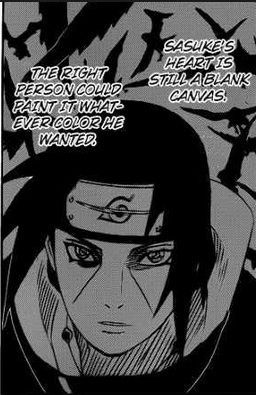
And I love this, because it does describe him perfectly. I think this statement stuck out to many readers.
What Itachi means is that Sasuke:
lacks the ability to look ahead and judge things clearly.
He is easily influenced- gullible, even.
And even though he managed to cling to some moral standard up until Itachi’s death- not killing innocent people- everything else is easily replaced on a whim.
By focusing solely on killing Itachi, Sasuke left himself wide open to attack. Not physical attack. Something even more dangerous: emotional manipulation. He neglected every aspect of himself other than the physical- and the desire for revenge. What I’m saying is that Sasuke is extremely emotionally stunted. And people recognize this, and use this to their advantage. Anyone can come up to him and plead to his cause, and he will fall for it, against any better judgement he may have. If he were a character in a video game, he essentially maxed out his stats in one area, and left every other area under-developed and weak.
His ideals always outweigh his reality.
So, how does this aspect of his character get him in trouble? Well, let’s discuss a very big shift in Sasuke’s character.
Madara’s influence:
Back to the Naruto timeline:
The truth about Itachi totally shakes Sasuke’s world. And “Madara” is totally loving this. He’s going to use this to his advantage.
So. Sasuke feels that he has a new duty. He must now somehow avenge his brother. And this means he should kill the Kage- wait, what?
Oh right. Madara is talking into his ear.
“Itachi literally lived and died for this, so obviously he wouldn’t want what I’m suggesting, but you should totally do the dirty work for me and destroy everything Itachi believed in. That way, you can avenge him. I’m totally like, empathizing with you right now. I’m definitely not just saying this to get you to do what benefits me.”
Ok, so of course, Sasuke blindly listens.
And this is the second part to the main theme that Kishimoto explores with Sasuke’s character. What happens when a person, devoid of anything in the world besides revenge, falls into a false sense of justice? What happens after that quest for vengeance is fulfilled?
And at this point in the show, we see a new Sasuke. This Sasuke is very different from before. Why?
Sasuke is throwing his past moral compass out the window.
He’s going to kill people he doesn’t even know are guilty of anything. (Danzo definitely saw it coming, but Tsunade? What has she done to Sasuke? She is a great Hokage! She has nothing to do with Itachi. Neither does Gaara, or the rest of the current Kage.)
But Sasuke doesn’t care about this! Madara convinced him that they are evil, because of their position.
The Kage are automatically evil, because they represent authority. And it’s important to recognize that Sasuke doesn’t care about past authority or current authority- it is not his authority, so therefore, it is bad. It needs to be purged.
Sasuke is putting his problems on unrelated people.
And this is when Sasuke really falls into some dark stuff. He is actually becoming more of a villain.
The Final War:
By the time we see him in the war, he is ranting about “revolution.”
Sasuke is very deluded. And it’s due to outside influence. He is young and brash, and his world is very small. So so very small. All he knew up until this point was revenge and his brother. He doesn’t know how to live a normal life, or how to let things go. It’s like he was asleep until this point, and he finally realized that there’s a bigger world out there, and he needs to do something about it!
Sasuke is rather pitiful. But very zealous and dangerous. And I think people in the fandom downplay this too much. People want to like Sasuke- resonate with him. Up until recently, everyone is nodding their heads like “we feel you Sasuke, this sucks.” But people need to recognize when pity needs to stop.
Sasuke’s best trait is hyper-focusing on his goal. And this is also the most dangerous thing about him. He is easy to manipulate, as I have established earlier. And he is on the far end of fanaticism. He isn’t thinking about individuals anymore. He is only thinking about the collective... kind of like... the Akatsuki?
After all, didn’t the Akatsuki want to create world peace by killing a bunch of innocent people and enforcing lack of conflict through silence?
And we all agree that the Akatsuki are totally missing the mark, correct?
After all, is it really for the greater good? Sacrificing innocent people for one’s own idea of peace? Kind of narcissistic to assume one knows best.
Sasuke is talking about doing WHATEVER IT TAKES to “change the world” to make it “better”. Whatever his version of “better” is. And this is totally wrong! How is becoming what you hate most supposed to prove that your version of peace is correct?
Sasuke is getting high on “justice.” And by justice, I mean elevating himself into the god plane. He thinks he is better than everyone else- his opinion is the only one that matters. After all, these pathetic people can’t possibly think for themselves. He must force them to see the truth!
And he thinks this because his world is so small, and “Madara”, implanted an idea onto his “blank canvas.”
This is literally what’s going through Sasuke’s mind during the final arc of the show. It is extreme, and exactly the opposite of what Naruto, our protagonist, believes. So obviously there is going to be a clash.
This is where I think the author screwed Sasuke over.
Ditching the Main Theme of Sasuke’s Character:
Sasuke up until this point only knows a few things: His first reason for existing was based on a lie, and he now thinks he is fighting for the truth- that Itachi died for nothing good, and it is up to him to change the world.
Naruto fights Sasuke, and when Sasuke realizes he can’t beat Naruto in a PHYSICAL FIGHT, he suddenly changes his drastic opinions on everything he believes in. He says “Sorry, I was crazy, let’s start over.” And that’s it. End credits start to roll.
Kishimoto took Sasuke’s character on a very long journey. And it was all leading up to this peak- the point where Sasuke literally bursts. Sasuke resembles a very specific type of person- a particular path one can take in life. It is about a boy who chose the life of vengeance over happiness and positive personal growth. And the consequences of that decision.
During the entire show, I am expecting something drastic to happen to Sasuke. He is a drastic character. He is a flawed character- a beautiful example of what revenge can do to a good person. As an author, it is important to make this character’s fate what it is being set up for- tragedy.
So there were two (good) writing options here:
Sasuke either needed to die, because his mind could not be changed and he was a danger to innocent people, or, he needed to be redeemed over a decent period of time.
By the time Sasuke enters the war, he is far gone. Is it possible to change his mind again? Sure. He is still young and bendable. But it wouldn’t take two seconds.
Madara didn’t change Sasuke’s mind- he filled blank space. Implanted an idea. He put something on a blank canvas.
Naruto, however, has to undo all of this brain washing. He has to change his mind.
There is a difference here.
Covering a blank canvas with color is easy. But covering those old colors with new ones is hard, and takes time.
As in, Kishi really needed to rethink his timeline for his manga.
The best thing he could have done, since he obviously wanted Sasuke to be redeemed, was to make Naruto fight Sasuke BEFORE the war.
Here’s an alternate timeline:
Naruto finally catches up with Sasuke before the war, and they fight it out. Sasuke loses, but only by a bit. And Naruto actually talks to him. Not the usual “this is my Dream”, but listening to Sasuke and discussing his experiences, and countering his opinion in a personal manner.
Naruto thinks he can’t change Sasuke’s mind, and he worries that if he doesn’t kill Sasuke, something bad will happen to those he cares about in the future. And Kishi puts a lot of time and emphasis on this encounter. This exchange of opinions. This is the cornerstone of their relationship up until this point.
But Naruto decides not to kill Sasuke, explaining the concept of unconditional love to him. And he leaves him.
And Sasuke spends time thinking on this.
And then the final battle begins, and Sasuke drops in, deciding on helping Naruto after all. Thus concluding the Naruto/Sasuke conflict.
This order of events would have been much better. Naruto and Sasuke fighting after the war seemed unnecessary, and it just didn’t flow. It made Sasuke look extremely fickle, when he is actually very stubborn.
Based on this sequence of events, why would Sasuke help Naruto defeat Obito? When Obito was literally trying to change the world “for the better,” just like Sasuke was. Maybe Sasuke didn’t agree on the method. Sasuke would rather kill everyone and start over with him as supreme leader. (Which is... worse than what Obito had in mind? Obito wanted everyone to live in a peaceful dreamworld, where everything was good.)
So, I guess my point is that Kishimoto had a path for Sasuke, and a few points to make about his choices. But he then ditched the consequences of those choices. Ignored the theme he created from the very beginning. In the canon timeline, we as an audience didn’t really learn any lessons from Sasuke’s journey. Sasuke’s part in the story kind of fizzled out. It didn’t have the zing I was hoping for.
Sasuke deserved more attention. More focus on the climax of his personal journey. And more time for the falling action after this climax.
For me to want to see him back at Kohona, I wanted more of his thought-process and journey. It would take time for a person as damaged as Sasuke to fit back into the social confines of his old village.
I would love additional thoughts on this! :)
435 notes
·
View notes
Photo
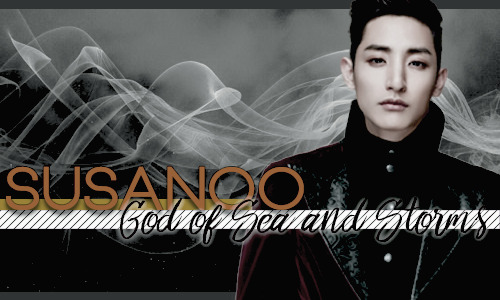
We have a new citizen in Mount Phoenix:
Susanoo, the God of Sea and Storms, whose origins stem from Ancient Japan. He is now a swim instructor at Zero to Hero.
FC NAME/GROUP: lee soohyuk GOD NAME: susanoo PANTHEON: japanese OCCUPATION: swim instructor at zero to hero HEIGHT: 1,84m WEIGHT: 61kg DEFINING FEATURES: tattoo of angry waves from the left side of his chest and shoulder blade to his elbow. when he’s starting to lose his temper and/or using his powers, his eyes turn to a bright sea green.
PERSONALITY: susano-o has definitely calmed down after all these centuries away from his pantheon, especially because he’s trying (the keyword being exactly trying) to be a better brother and therefore a better god in general. he doesn’t go around causing as much havoc as before for the smallest pettiest things but it doesn’t mean that he lost his easily triggered temper. he’s just less destructive when angry now. it’s not perfect and he still has the tendency to act selfishly and only look at things from his own point of view, needing a (very hard push) nudge to understand and empathize with others. it doesn’t help that he’s still as good with words as he was when he was young and wild which is not very much. susano-o is blunt and sounds rude and aggressive even when he’s trying to be gentle. even when he’s quiet, he always has this intense aura around him, always looks annoyed and fully done with this bullshit or angry with something.
he’s very much the type to hold grudges for centuries. actually susano-o still has a lot of hard feelings towards his family, not only his siblings but also his father, for some events on his life that he genuinely thinks were unfair to him. he might’ve grown more patient throughout time but it doesn’t mean that he got any more forgiving. but at least, for believing that he had a shitty dad, susano-o tries to give them what his own father didn’t throughout his life (even though he might be a little too awkward with dealing with his own kids) and he’s very protective over them. he also tries not to play favorites because knows first hand how it sucks.
but it also means that when susano-o cares, he cares. he’s clumsy with his feelings because he always feels too much and he ends up not knowing how to deal with it properly (well, at least not in a healthy and ‘let’s-not-destroy-things-until-these-stupid-feelings-go-away’ way). he’d drown the world for eternity if it meant protecting those he holds dear, would go through the humiliation and have his pride as a god being ripped off of him again and again and again if it meant the happiness of the ones he loves.
susano-o is still a very prideful god however and even if he admits (to himself) his wrongdoings from the past and how some of it could be explained but not justified by his sister and daddy issues, it’s very hard for him to say it out aloud and apologize through words. he’s much better with gestures (albeit usually small ones) than expressing himself verbally in any situation. he also gets very easily defensive when accused or when people call his bullshit out. even if he knows they’re right, susano-o’s knee jerk reaction is to defend himself with claws and teeth and he’ll not give up his ground.
HISTORY:
i. basically susano-o’s problems start with dad.
susano-o is understanding enough to know that it isn’t like his father can choose what kid is born from where, so he doesn’t blame him that his siblings are born from his eyes and then there’s little young susano-o came from his nose. cool. what isn’t cool is how he shamelessly shows how much he prefers his other kids than susano-o. how he gives them greater titles like “the sun goddess, the great deity that lights the day” and “ the moon god, the great deity who lights the night” then the youngest is left with the leftovers. they’re called the three noble children who own the sky, but susano-o is the only one who has no part in that sky. amaterasu is entitled to the day and tsukiyomi to the night.
and then like any child, susano-o wants to see his mother, wants to at least have someone on his side for once, even comes with a plan to try to get her back, something that even father failed to do. but then this is susano-o. he’s not only denied that, but also is kicked out of heaven for it.
ii. then there’s dear older sister.
he and amaterasu go a very long and even more complicated way. susano-o admits that he might’ve had way too much fun teasing her and he might’ve crossed the line once or twice and, yes, he was very vocal about his discontentment of his assigned land but that would never mean he’d try to take something that wasn’t his, that wasn’t given to him. he wanted them to recognize that he was worth of the sky and taking it by force, even if very tempting, would just destroy that whole point. however, they were family and susano-o, in his stupidity, thought that amaterasu and the other gods would remember that, would know that he didn’t have those kind of ill-intentions.
but then susano-o was stupid and wrong because amaterasu showed him nothing but hostility when he came to big her goodbye and he was even more stupid and wrong in proposing what was supposed to be a nice game to prove that he was sincere, and his intentions were pure. the one who managed to give birth to greatest gods would prove they were right. amaterasu uses his sword and gives birth to three goddess and susano-o uses her necklace and from there five gods are born. however, instead of admitting her defeat, amaterasu argued (cheated) that the gods were hers because they came from her necklace and the goddess were his because they came from his sword and when susano-o pointed out the absurdity of it and she should just accept that she lost and therefore wrong, no one took his side.
in a fit of rage and frustration, of well, if you want me to play the bad brother, then that’s what i’ll do, he leaves heaven to never return (at least so soon) with a trail of destruction and chaos that includes a dead sacred horse, another dead handmaid and his sister leaving to hide herself in a cave for heavens know how long.
iii. surprisingly the solution comes in the form of a crying couple, mourning over the death of their seventh daughter and fearing for the eighth.
susano-o has never been any hero, that’s something he was sure from the beginning and he never claimed to be. he had no interest in helping a couple of elders, especially when he was still recovering from his newest and possibly more permanent exile from takamagahara. he had no intentions to kill any monster for people he didn’t know, for mortals he didn’t care for.
but then he sees her.
remembering it now, susano-o is extremely embarrassed about the corny thoughts that crossed his mind back then. he was mesmerized by her beauty, charmed by her eyes, enchanted by her voice. he has always heard about what they talked about amaterasu, endless tales and songs about how her divine beauty and susano-o genuinely thinks that those who wrote about his oldest sister, never laid his eyes on kushinada-hime, because then those would be about her.
(or maybe they’d be starstruck like susano-o, not able to find enough words to do her justice).
he knew from the moment he laid his eyes on her that he’d fight his whole pantheon
POWERS:
storm manipulation: is able to create, shape and manipulate storms which includes strong wind (cyclones and windstorm), heavy precipitation (rainstorm).
earthquake generation: is able to create and manipulate earthquakes, usually but not limited to underwater lands which results in tsunamis and natural disasters.
water manipulation: is able to create, shape and control bodies of water. in his case, it also includes ocean manipulation in which he can control not only seawater, but the oceans’ tides, waves and currents. he’s also able to breath underwater.
STRENGTHS:
surprisingly patient in the sense that he doesn’t rush to get things done
protective and loyal over those he holds dear
always sincere about his intentions and feelings. he’s a lot of bad things but not a liar nor deceiver. he’s also very easy to read.
also surprisingly very open-minded about a lot of things and doesn’t tend to be very judgmental about people unless they’ve done something against him
WEAKNESSES:
still has anger issues and, sure, his self control is better than before but it doesn’t really mean much because it’s been always very shitty. it’s like going from 0 to 0.5
doesn’t listen well to others
gets lethargic (and grumpier) when being away too long from the sea, even in the island, he still needs to go to the coast a couple of times to avoid that.
also hates sunny days but it’s something more related with his bad relationship with amaterasu and even now it’s just something he can easily shrug off.
1 note
·
View note
Photo

[Original fic]
A short prose I made from a canon I have in my head about Lucilius (prequel). Lucilius x OC (pls don’t hate me), mature themed. It was based on Jungian Archetype. Forgive my occasionally bad grammar I am doing this on a whim and too busy to hire proofreade ;-;
Illust by myself
===========================================================
"Beyond death, what is actually there?" "A temporary loss of consciousness?" "Would you believe in such things" "It was told to comfort people. To assure them that they will regain their eden. That after death, there will be peace" "What if it's an eternal emptiness worse than anything ever? a loop of misery?" The man dressed in white robe clenched his fist. His facial expression was a little uptight. "Quit trying to shove your twisted logic onto me, Nerissia" The docile, fragile looking girl paused. Her velvet blue eyes lensed to his slender, majestic feature. Her maroon, light pink tinted lips formed a little smile. "It's weird telling me to stop" she muttered. "After all, I am your [underworld]". The man was ticked off. But as usual, never he let show any kind of softness. Not even during the intercourse of their mind nor their concrete bodies. [Why would you do this] [Why? because I want to learn this thing what those foolish highly praise] [Affection] [But not even when our mind and body are one, I can understand] Although admittedly, days during the experiment of caressing, discovering, opening, entering both her body and mind made his resolve kind of wavered. She was made as his underworld; his own anima, the part of his mind that supposedly cannot rise to the surface. Compared to anything that exist in this world, "She" would be the only consciousness he could accept and swallow without a taste of disgust. After all, he was born that way. To bring chaos. Anything could have a chance to change his mind. But higher form of platonic love, affection, or empath is definitely a futile shot. "Nerissia, if we ever being born as one of their kind, would we love each other?" The girl did not answer. She only moved slowly toward him. Then she caressed him, sealing all his words and let his body claim hers to fall again into their usual dance. -- The [underworld] Nerissia, is now nothing but a soul ceasing to exist. That man, calmly smiles. "I did the right thing" "Maybe, the only way I can love ever is to destruct" "Therefore, Nerissia. This is how I'd deliver it to you" "I'll [love] you eternally, you should be able to understand this" "I was not made to be an evil being who shifts his heart just because the warmth of friendship" "Nerissia.. you're the only one who can accept this" Inside the inferno, the girl with a lance piercing through her chest finally closes her eyes into eternal sleep. Seconds before that her velvet blue eyes met his, and her cold lips formed a loving smile.
19 notes
·
View notes